

14 Proven Tips For Completing Assignments

Completing assignments can be a daunting task, but there are a few things that you can do to make the process a whole lot easier.
Are you finding it difficult to complete your assignments on time? If you’re looking for some tips to help you get organized and stay on track, you’ve come to the right place. In this post, I’ll share some helpful strategies that will make completing your assignments a breeze.
But first, let’s analyze why it’s essential that you complete your assignments on time.
Why are assignments important?
Though often met with groans and complaints, academic assignments are actually beneficial in a number of ways. For one, they force students to engage with the material on a deeper level, encouraging them to really think about what they’re learning and stay on track with their studies.
In addition, academic assignments help students to develop important research, writing and study skills that will be useful in college and beyond.
Academic assignments also give students the opportunity to receive feedback from their instructors on their work.
Assignments are a great way to increase parent engagement in learning and for students to develop a sense of responsibility.
Notably, despite its benefits, too many assignments can do more harm than good.
Too much assignments can interfere with free time and involvement in extra-curricular activities. Assignment completion may be increasingly frustrating and stressful when there are challenges with the home environment. O’Rourke-Ferrara, 1998
Why is completing assignments on time important?
Completing assignments on time allows you to fully engage with the material and understand the concepts.
Subsequently, you’ll likely earn better grades and improve your chances of success in school. Additionally, completing assignments in a timely manner will also give you a sense of accomplishment and satisfaction.
Completing assignments on time demonstrates to your instructor that you are capable of meeting deadlines. This is important in both academic and professional settings.
Plus we all know that once you start falling behind on assignments, it can be difficult to catch up.
Finally, completing assignments on time will likely improve your sleep and reduce stress levels.
According to research, completing assignments improves independence, self-discipline, and time management skills. In addition, it has been linked with better grades and academic success. planchard et al., 2015

Tips for completing assignments
So how can you make sure that you complete your assignments on time? Here are a few tips that may help:
1. Read the assignment instructions carefully
Make sure you understand what is expected of you before you start working on the assignment. Read the instructions carefully, and if anything is unclear, be sure to ask for clarification.
2. Identify why the assignment is necessary
Identifying why the assignment is necessary is an important first step for success. Acknowledging the importance of a task or goal can help you stay motivated to do the best possible work and see meaningful results.
It gives purpose to your efforts, and this in turn can help provide focus and direction, leading to better results through hard work and dedication.
Research shows that the main motivating factors for homework completion were: (1) Reinforcement: desire to learn or master the material (2) Credit (3) Extra-credit planchard et al., 2015
3. Start early to complete assignments on time
Assignments can take longer than you think, so start working on them as soon as they’re assigned. This will help you avoid last-minute stress and ensure that you have enough time to complete the assignment to the best of your ability.
4. Set goals for assignment completion
One way to stay on track with an assignment is to break it down into smaller goals. For example, if you have a research paper to write, your goal for the first day might be to choose a topic and find five sources.
Once you’ve met that goal, you can set a new goal for the next day. Breaking the assignment down into smaller tasks can help to make it feel less overwhelming, and it can also help you to track your progress.
5 . Create a schedule to finish assignments
Once you know when the assignment is due, create a schedule that breaks the work down into manageable tasks. This will help you stay on track and avoid feeling overwhelmed by the assignment.
Research shows that the most common demotivating factors for homework completion were: (1) Other commitments (2) Difficulty understanding (3) Too difficult or too long planchard et al., 2015
6. Identify the resources required for the assignment
Another important step in completing an assignment is to identify the resources that you’ll need. This might include books, articles, websites, or people you can interview. Having a list of resources will help you to focus your research and make the process easier.
7. Track your reference s when researching
As you’re doing research for your assignment, be sure to track the references that you’re using. This will save you time when you’re writing your paper and will ensure that you give credit to the sources that you’ve used.
8. Set aside uninterrupted time for assignments
Once you have a schedule, set aside time each day or each week to work on the assignment. During this time, turn off distractions like your phone and social media. This will help you stay focused and make the most of your time.

9. Ask for help if you get stuck
If you’re struggling with the assignment, don’t hesitate to ask for help. Talk to your professor, a tutor, or a friend who is doing well in the class. They can offer guidance and support that can help you get back on track.
10. Take breaks when completing assignments
Working on an assignment for long periods of time can be overwhelming and lead to burnout. To avoid this, take breaks throughout the day or week. during your break, do something that you enjoy or that will help you relax.
11. Celebrate your progress
As you complete tasks on your schedule, take a moment to celebrate your progress. This will help you stay motivated and focused. It can be something as simple as taking a break after completing a section or giving yourself a small treat.
12. Proofread your assignments
Once you’ve completed the assignment, take the time to proofread it. This will help you catch any mistakes and make sure that your work is of the best quality.
13. Submit your assignments on time
Make sure to submit your assignment on time. If you’re having trouble with this, talk to your professor or a tutor. They may be able to offer extension or help you get back on track.
14. Relax after completing each assignment
After you’ve submitted the assignment, it’s important to relax. Take some time for yourself and do something that you enjoy. This will help you relax and prepare for the next assignment.
Final words on proven tips for completing assignments
If you follow these tips, you will be well on your way to acing any assignment. Do you have any other studying or coursework tips that have worked well for you?
Drop a comment below and let me know. Best of luck in all your future assignments.
Read also: 22 Key Tips To Easily Improve Writing Skills
O’Rourke-Ferrara, Catherine. “Did You Complete All Your Homework Tonight, Dear?” Information Analyses (070) Opinion Papers (120) — Reports Research (143) 1998
Planchard, Matthew S. et al. “Homework, Motivation, and Academic Achievement in a College Genetics Course.” Bioscene: The Journal Of College Biology Teaching 41 (2015): 11-18. https://files.eric.ed.gov/fulltext/EJ1086528.pdf
Similar Posts

67 Powerful Quotes On Communication To Keep You Inspired
Are you looking for some quotes on communication that will inspire and motivate you? If…

22 Common Email Mistakes + Tips To Avoid Them
Email mistakes can lead to loss of business, or worse, a damaged reputation. It’s time…

55 Common Writing Terms, Meanings & Examples To Learn Right Now
Knowledge of common writing terms will help you produce more polished pieces that make the…

20 Golden Rules To Improve Email Etiquette
An email may be a fast, easy way to communicate with friends, family and co-workers….

22 Key Tips To Easily Improve Writing Skills
Are you having trouble receiving good reviews for your writing? If so, don’t worry –…

Rushana Greenidge-Horace
Rushana is a dynamic, knowledgeable professional with almost a decade of experience in the healthcare industry. She remains committed to promoting holistic health and wellness.
Leave a Reply Cancel reply
Your email address will not be published. Required fields are marked *
Save my name, email, and website in this browser for the next time I comment.


The 5 Best Assignment Help Websites for College Students

The popularity of professional assignment help websites has grown significantly during the pandemic times when most students had to make a complex shift and start with their online studies.
There were numerous challenges that had to be faced, including heavy workload issues, misunderstanding of the grading rubric, and academic pressure.
The majority of students approach online help as a way to avoid plagiarism and receive better grades as they share their concerns with trained experts.
Still, finding the best assignment help services can be quite challenging!
Check out a list of reliable assignment help offerings online aimed at college students!
The Best Assignment Help Websites for College Students
1. assignmentbro.
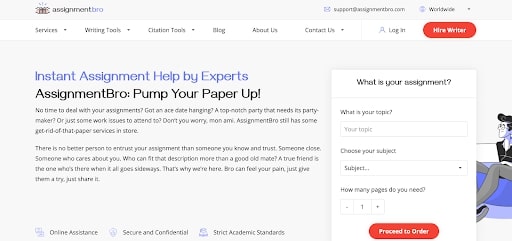
Company’s History. This friendly company belongs to relatively new offerings, yet they have already earned the hearts and minds of school and college students worldwide. They are reputable and always place the client’s needs first, as they are managed by a great team of university graduates who know what students are going through.
Reliability. A plethora of online reviews and the presence of direct contact with a writer makes them reliable. There are free revisions and refunds available as well. Moreover, there are excellent citation tools and writing tools for paraphrasing, a words-to-minutes converter, and a conclusion generator.
Quality of Assignments. Our Law assignment has been delivered on time, and the paper has been free of grammar or style mistakes. The formatting has been done properly, and the content itself has been done professionally with all citations in place.
Prices. As we looked for the best assignment services, we wanted to approach only the most affordable services where the quality still remains high. At AssignmentBro, they do not have a fixed price, which is a good thing because you can negotiate the final price. Our price depended on our subject, the qualification of the writer, and the deadline. It was affordable!
Reviews. Their Sitejabber page shows that they have 4.7 stars based on 53 reviews. People praise them for their affordability and their friendly attitude. The Trustpilot page has 4.4 stars based on 29 reviews. Their writers are always praised as well as their support team.
Customer Support. It deserves six stars out of five because they are the most caring and friendliest when it comes to getting your challenges fixed.
Why Choose It? A young company that is aimed at getting you understood as you ask for academic writing help. Affordable and high-quality writing with a plethora of helpful free tools.
2. A Research Guide
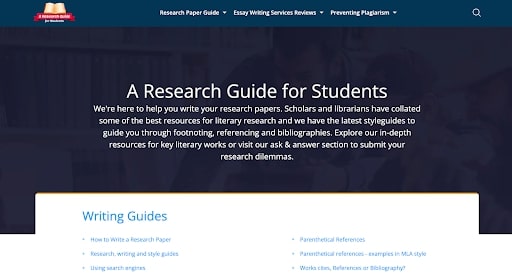
Company’s History. This great service has been around for more than 10 years now, yet they are rarely mentioned when the best assignment writing services are mentioned. The reason for that is that they are not your typical company because it is a great hub for all things research writing. They offer free materials, tutorials, and templates even before you place an order.
Reliability. They cooperate with numerous institutions and businesses as they offer innovative research paper writing assistance and explore all the latest and most efficient ways to deliver excellent research. They have won several awards in the field and represent a fully legit service.
Quality of Assignments. This is where they truly stand out, as their specialists will ask you all the possible questions before they match you with a specialist in their field. We have approached them for a Political Sciences research paper, and they have delivered an excellent paper with credible sources, formatting, and high-quality research.
Prices. The prices start at $14.99 per page and belong to more expensive writing solutions. Still, when you think about the direct communication and assistance that you receive, it’s totally worth it.
Online Reviews. This is where things get rather rough, as the number of reviews is extremely limited. Still, we could find out feedback from professional educators, online course creators, and dissertation-writing students who needed complex research. Their testimonials speak in favor of the company’s reputation.
Customer Support. The support agents represent experienced researchers who will happily guide you through the website and help you with anything. They are available 24/7.
Why Choose It? Look no further if you need serious research paper writing help and want to enjoy freebies that will help you to deliver a perfect assignment.
3. EduBirdie
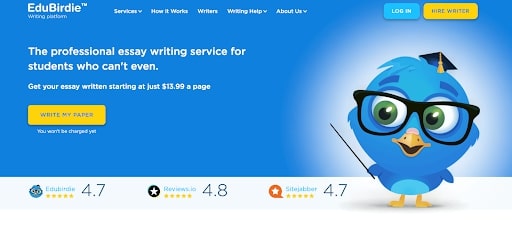
Company’s History. The company is one of the most famous names in the industry. Their website states that they have been offering legit academic help since 2014. The company runs a blog and stands at the top of technical and academic innovations.
Reliability. They let you talk to your writer directly and provide free paper revisions. If you are not happy with the paper, they offer full refunds. The reviews online show that they are safe to use and follow their promises.
Quality of Assignments. Speaking of online assignment help websites, they offer timely delivery and focus on anything from essay writing and dissertations to personal statement writing and online exams. Placing an order with them, our experts received expert assistance, and the paper contained no grammar, style, or plagiarism issues.
Prices. The prices here start at $13.99 per page and remain affordable if we compare these services to similar offerings online. They implement a bidding system so your final price will depend on the writing quality chosen, the subject, the deadline, and the popularity of your subject.
Online Reviews. This company is constantly mentioned on Sitejabber, Trustpilot, and YouTube (they have their channel), and they are popular among social media users. They are rated at 4.7 out of 5 total points, which is a sign of reliability. Most of their clients are happy with the results.
Customer Support. They are trained well and respond immediately. We had a nice experience talking to the support agents. They are available 24/7 and offer human help with no bots.
Why Choose It? The positive reputation of the company and the chance to talk to your writer directly place them at the top of the most popular assignment help websites you can find these days. They are plagiarism-free and offer reliable quality at an affordable price.
4. SameDayPapers
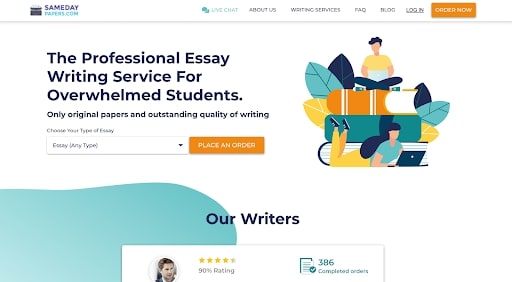
Company’s History. The company has been around since 2017 and started out in Great Britain and Australia. Later on, they added affordable writing help services in the United States as well. They are the best choice if you are an ESL student or a learner looking for complex custom assignments that focus on Sociology, Psychology, History, or Engineering.
Reliability. They offer free paper revisions and also provide you with a free tool to check your grammar. Regarding the plagiarism, they also let you check things free of charge. Employing native English speakers, they are very strict about their writers and let you cooperate with verified specialists.
Quality of Assignments. Placing an order is easy and logical here, which clearly shows that we are dealing with the best website for assignment help. Checking the paper on Psychology, we can state that it has been delivered even earlier than our deadline. The paper was original, had excellent formatting, and the content has been up to the highest standards.
Prices. They represent an affordable and the best website to do assignments, with their prices starting at $12.99. If you are looking for reliable editing services, the prices will start at $5.5 per page.
Online Reviews. Researching this company’s background, we could locate over two hundred reviews. Most of them are positive and come from the United States, the UK, and Australian users. The total rating is 4.38/5 points.
Customer Support. It’s available for American users, and they respond right away by assisting you with anything from placing an order to finding a specialist that matches your needs.
Why Choose It? It’s one of the global companies that implement verified writers and can offer professional assistance. There are also UK and Australian branches, should you need specific help or sources.
5. EduZaurus

Company’s History. The story of this amazing sample essay database and academic writing company dates back to June 2015. Since then, they have collected a great resource for students coming from all disciplines. The company’s website claims that they have completed over 100,000 assignments as 2021 has started. They provide hundreds of skilled writers, yet what makes them unique is a great collection of free essay samples. It makes them one of the best choices when you need inspiration.
Reliability. Offering legit academic assistance, they can be safely marked as the best assignment writing help service for their collection of samples alone that showcases their work and provides a general idea of what can be expected. There are free revisions and refunds.
Quality of Assignments. Placing an order for the coursework paper in Journalism, we received an excellent document that has been formatted correctly and contained high originality. The grammar and style have been done well. The delivery has been set to only eight hours, yet the paper has been delivered on time.
Prices. Since there are many factors that affect the price per page (writer’s level, your deadline, task specifics), our price has started at $25 per page, yet the general pricing can vary between $20 and $50 if your order is urgent. The prices with a longer deadline start at $12.99 per page. Remember that you should always wait for the best bids to appear.
Online Reviews. Sitejabber users gave them 4.52 stars out of 5 based on 29 reviews. As for TrustPilot, they’ve earned 4.3 out of 5 stars based on 15 testimonials. Most people praise them for being legit and trustworthy.
Customer Support. They have an online chat feature, which is available 24/7. The support remains friendly even if you run into problems.
Why Choose It? This service is the best choice when it comes to finding free samples for inspiration, yet their writing assistance is also up to the highest standards. They cover a wide range of subjects and have a minimum deadline of 3 hours that actually works.
Where Can I Find Trustworthy Assignment Help?
You can find it online, as there are numerous offerings.
As a way to save time, we have tested and evaluated five of the best homework help websites that can be trusted.
Take your time to explore them and see which of them fits your academic needs first.
What is The Best Assignment Help Website You Can Recommend?
While the “best” is always subjective, you may safely check these five entries explored above.
Each of them is different and provides specific benefits in each case
A Research Guide service is the best choice for research paper writing, while EduZaurus will provide you with a great selection of free samples!
Is Assignment Help Described Legit?
Absolutely! Every assignment help website on our list has been tested in terms of being legit .
These services are acknowledged providers of academic help online and are absolutely safe to use, as many online reviews can confirm.
Sharing Your Instructions Well is Essential!
As you are looking through websites that do your homework online, remember that you should always start with careful preparation and sorting of your instructions.
These must be shared with a chosen specialist and have a clear description because it is the only way to achieve success and the necessary degree of clarity.
Although many services like EduBirdie or AssignmentBro let you talk to your writer directly, you must be precise with your instructions and share anything from the assignment grading rubric to the comments and recommendations from your college professor.
It will help you to get the best quality and save time as you avoid mistakes and explain what you expect to see as you place your assignment request.
Regardless if you require research paper writing services or seek an expert who can proofread your work and fix grammar mistakes, sharing your instructions should always come first!
You may also like

Seven Ways to Make your College Essay Stand Out

8 Differences Between Aussie and American Schools

Top 5 Most Difficult IB (International Baccalaureate) Subjects

Benefits of Campus Living: Do Students Living on Campus do...

8 Reasons Why You Should Study Accounting Degrees

8 Best Essay Writing Services According to Reddit and Quora
About the author.

CB Community
Passionate members of the College Basics community that include students, essay writers, consultants and beyond. Please note, while community content has passed our editorial guidelines, we do not endorse any product or service contained in these articles which may also include links for which College Basics is compensated.

Understanding Assignments
What this handout is about.
The first step in any successful college writing venture is reading the assignment. While this sounds like a simple task, it can be a tough one. This handout will help you unravel your assignment and begin to craft an effective response. Much of the following advice will involve translating typical assignment terms and practices into meaningful clues to the type of writing your instructor expects. See our short video for more tips.
Basic beginnings
Regardless of the assignment, department, or instructor, adopting these two habits will serve you well :
- Read the assignment carefully as soon as you receive it. Do not put this task off—reading the assignment at the beginning will save you time, stress, and problems later. An assignment can look pretty straightforward at first, particularly if the instructor has provided lots of information. That does not mean it will not take time and effort to complete; you may even have to learn a new skill to complete the assignment.
- Ask the instructor about anything you do not understand. Do not hesitate to approach your instructor. Instructors would prefer to set you straight before you hand the paper in. That’s also when you will find their feedback most useful.
Assignment formats
Many assignments follow a basic format. Assignments often begin with an overview of the topic, include a central verb or verbs that describe the task, and offer some additional suggestions, questions, or prompts to get you started.
An Overview of Some Kind
The instructor might set the stage with some general discussion of the subject of the assignment, introduce the topic, or remind you of something pertinent that you have discussed in class. For example:
“Throughout history, gerbils have played a key role in politics,” or “In the last few weeks of class, we have focused on the evening wear of the housefly …”
The Task of the Assignment
Pay attention; this part tells you what to do when you write the paper. Look for the key verb or verbs in the sentence. Words like analyze, summarize, or compare direct you to think about your topic in a certain way. Also pay attention to words such as how, what, when, where, and why; these words guide your attention toward specific information. (See the section in this handout titled “Key Terms” for more information.)
“Analyze the effect that gerbils had on the Russian Revolution”, or “Suggest an interpretation of housefly undergarments that differs from Darwin’s.”
Additional Material to Think about
Here you will find some questions to use as springboards as you begin to think about the topic. Instructors usually include these questions as suggestions rather than requirements. Do not feel compelled to answer every question unless the instructor asks you to do so. Pay attention to the order of the questions. Sometimes they suggest the thinking process your instructor imagines you will need to follow to begin thinking about the topic.
“You may wish to consider the differing views held by Communist gerbils vs. Monarchist gerbils, or Can there be such a thing as ‘the housefly garment industry’ or is it just a home-based craft?”
These are the instructor’s comments about writing expectations:
“Be concise”, “Write effectively”, or “Argue furiously.”
Technical Details
These instructions usually indicate format rules or guidelines.
“Your paper must be typed in Palatino font on gray paper and must not exceed 600 pages. It is due on the anniversary of Mao Tse-tung’s death.”
The assignment’s parts may not appear in exactly this order, and each part may be very long or really short. Nonetheless, being aware of this standard pattern can help you understand what your instructor wants you to do.
Interpreting the assignment
Ask yourself a few basic questions as you read and jot down the answers on the assignment sheet:
Why did your instructor ask you to do this particular task?
Who is your audience.
- What kind of evidence do you need to support your ideas?
What kind of writing style is acceptable?
- What are the absolute rules of the paper?
Try to look at the question from the point of view of the instructor. Recognize that your instructor has a reason for giving you this assignment and for giving it to you at a particular point in the semester. In every assignment, the instructor has a challenge for you. This challenge could be anything from demonstrating an ability to think clearly to demonstrating an ability to use the library. See the assignment not as a vague suggestion of what to do but as an opportunity to show that you can handle the course material as directed. Paper assignments give you more than a topic to discuss—they ask you to do something with the topic. Keep reminding yourself of that. Be careful to avoid the other extreme as well: do not read more into the assignment than what is there.
Of course, your instructor has given you an assignment so that they will be able to assess your understanding of the course material and give you an appropriate grade. But there is more to it than that. Your instructor has tried to design a learning experience of some kind. Your instructor wants you to think about something in a particular way for a particular reason. If you read the course description at the beginning of your syllabus, review the assigned readings, and consider the assignment itself, you may begin to see the plan, purpose, or approach to the subject matter that your instructor has created for you. If you still aren’t sure of the assignment’s goals, try asking the instructor. For help with this, see our handout on getting feedback .
Given your instructor’s efforts, it helps to answer the question: What is my purpose in completing this assignment? Is it to gather research from a variety of outside sources and present a coherent picture? Is it to take material I have been learning in class and apply it to a new situation? Is it to prove a point one way or another? Key words from the assignment can help you figure this out. Look for key terms in the form of active verbs that tell you what to do.
Key Terms: Finding Those Active Verbs
Here are some common key words and definitions to help you think about assignment terms:
Information words Ask you to demonstrate what you know about the subject, such as who, what, when, where, how, and why.
- define —give the subject’s meaning (according to someone or something). Sometimes you have to give more than one view on the subject’s meaning
- describe —provide details about the subject by answering question words (such as who, what, when, where, how, and why); you might also give details related to the five senses (what you see, hear, feel, taste, and smell)
- explain —give reasons why or examples of how something happened
- illustrate —give descriptive examples of the subject and show how each is connected with the subject
- summarize —briefly list the important ideas you learned about the subject
- trace —outline how something has changed or developed from an earlier time to its current form
- research —gather material from outside sources about the subject, often with the implication or requirement that you will analyze what you have found
Relation words Ask you to demonstrate how things are connected.
- compare —show how two or more things are similar (and, sometimes, different)
- contrast —show how two or more things are dissimilar
- apply—use details that you’ve been given to demonstrate how an idea, theory, or concept works in a particular situation
- cause —show how one event or series of events made something else happen
- relate —show or describe the connections between things
Interpretation words Ask you to defend ideas of your own about the subject. Do not see these words as requesting opinion alone (unless the assignment specifically says so), but as requiring opinion that is supported by concrete evidence. Remember examples, principles, definitions, or concepts from class or research and use them in your interpretation.
- assess —summarize your opinion of the subject and measure it against something
- prove, justify —give reasons or examples to demonstrate how or why something is the truth
- evaluate, respond —state your opinion of the subject as good, bad, or some combination of the two, with examples and reasons
- support —give reasons or evidence for something you believe (be sure to state clearly what it is that you believe)
- synthesize —put two or more things together that have not been put together in class or in your readings before; do not just summarize one and then the other and say that they are similar or different—you must provide a reason for putting them together that runs all the way through the paper
- analyze —determine how individual parts create or relate to the whole, figure out how something works, what it might mean, or why it is important
- argue —take a side and defend it with evidence against the other side
More Clues to Your Purpose As you read the assignment, think about what the teacher does in class:
- What kinds of textbooks or coursepack did your instructor choose for the course—ones that provide background information, explain theories or perspectives, or argue a point of view?
- In lecture, does your instructor ask your opinion, try to prove their point of view, or use keywords that show up again in the assignment?
- What kinds of assignments are typical in this discipline? Social science classes often expect more research. Humanities classes thrive on interpretation and analysis.
- How do the assignments, readings, and lectures work together in the course? Instructors spend time designing courses, sometimes even arguing with their peers about the most effective course materials. Figuring out the overall design to the course will help you understand what each assignment is meant to achieve.
Now, what about your reader? Most undergraduates think of their audience as the instructor. True, your instructor is a good person to keep in mind as you write. But for the purposes of a good paper, think of your audience as someone like your roommate: smart enough to understand a clear, logical argument, but not someone who already knows exactly what is going on in your particular paper. Remember, even if the instructor knows everything there is to know about your paper topic, they still have to read your paper and assess your understanding. In other words, teach the material to your reader.
Aiming a paper at your audience happens in two ways: you make decisions about the tone and the level of information you want to convey.
- Tone means the “voice” of your paper. Should you be chatty, formal, or objective? Usually you will find some happy medium—you do not want to alienate your reader by sounding condescending or superior, but you do not want to, um, like, totally wig on the man, you know? Eschew ostentatious erudition: some students think the way to sound academic is to use big words. Be careful—you can sound ridiculous, especially if you use the wrong big words.
- The level of information you use depends on who you think your audience is. If you imagine your audience as your instructor and they already know everything you have to say, you may find yourself leaving out key information that can cause your argument to be unconvincing and illogical. But you do not have to explain every single word or issue. If you are telling your roommate what happened on your favorite science fiction TV show last night, you do not say, “First a dark-haired white man of average height, wearing a suit and carrying a flashlight, walked into the room. Then a purple alien with fifteen arms and at least three eyes turned around. Then the man smiled slightly. In the background, you could hear a clock ticking. The room was fairly dark and had at least two windows that I saw.” You also do not say, “This guy found some aliens. The end.” Find some balance of useful details that support your main point.
You’ll find a much more detailed discussion of these concepts in our handout on audience .
The Grim Truth
With a few exceptions (including some lab and ethnography reports), you are probably being asked to make an argument. You must convince your audience. It is easy to forget this aim when you are researching and writing; as you become involved in your subject matter, you may become enmeshed in the details and focus on learning or simply telling the information you have found. You need to do more than just repeat what you have read. Your writing should have a point, and you should be able to say it in a sentence. Sometimes instructors call this sentence a “thesis” or a “claim.”
So, if your instructor tells you to write about some aspect of oral hygiene, you do not want to just list: “First, you brush your teeth with a soft brush and some peanut butter. Then, you floss with unwaxed, bologna-flavored string. Finally, gargle with bourbon.” Instead, you could say, “Of all the oral cleaning methods, sandblasting removes the most plaque. Therefore it should be recommended by the American Dental Association.” Or, “From an aesthetic perspective, moldy teeth can be quite charming. However, their joys are short-lived.”
Convincing the reader of your argument is the goal of academic writing. It doesn’t have to say “argument” anywhere in the assignment for you to need one. Look at the assignment and think about what kind of argument you could make about it instead of just seeing it as a checklist of information you have to present. For help with understanding the role of argument in academic writing, see our handout on argument .
What kind of evidence do you need?
There are many kinds of evidence, and what type of evidence will work for your assignment can depend on several factors–the discipline, the parameters of the assignment, and your instructor’s preference. Should you use statistics? Historical examples? Do you need to conduct your own experiment? Can you rely on personal experience? See our handout on evidence for suggestions on how to use evidence appropriately.
Make sure you are clear about this part of the assignment, because your use of evidence will be crucial in writing a successful paper. You are not just learning how to argue; you are learning how to argue with specific types of materials and ideas. Ask your instructor what counts as acceptable evidence. You can also ask a librarian for help. No matter what kind of evidence you use, be sure to cite it correctly—see the UNC Libraries citation tutorial .
You cannot always tell from the assignment just what sort of writing style your instructor expects. The instructor may be really laid back in class but still expect you to sound formal in writing. Or the instructor may be fairly formal in class and ask you to write a reflection paper where you need to use “I” and speak from your own experience.
Try to avoid false associations of a particular field with a style (“art historians like wacky creativity,” or “political scientists are boring and just give facts”) and look instead to the types of readings you have been given in class. No one expects you to write like Plato—just use the readings as a guide for what is standard or preferable to your instructor. When in doubt, ask your instructor about the level of formality they expect.
No matter what field you are writing for or what facts you are including, if you do not write so that your reader can understand your main idea, you have wasted your time. So make clarity your main goal. For specific help with style, see our handout on style .
Technical details about the assignment
The technical information you are given in an assignment always seems like the easy part. This section can actually give you lots of little hints about approaching the task. Find out if elements such as page length and citation format (see the UNC Libraries citation tutorial ) are negotiable. Some professors do not have strong preferences as long as you are consistent and fully answer the assignment. Some professors are very specific and will deduct big points for deviations.
Usually, the page length tells you something important: The instructor thinks the size of the paper is appropriate to the assignment’s parameters. In plain English, your instructor is telling you how many pages it should take for you to answer the question as fully as you are expected to. So if an assignment is two pages long, you cannot pad your paper with examples or reword your main idea several times. Hit your one point early, defend it with the clearest example, and finish quickly. If an assignment is ten pages long, you can be more complex in your main points and examples—and if you can only produce five pages for that assignment, you need to see someone for help—as soon as possible.
Tricks that don’t work
Your instructors are not fooled when you:
- spend more time on the cover page than the essay —graphics, cool binders, and cute titles are no replacement for a well-written paper.
- use huge fonts, wide margins, or extra spacing to pad the page length —these tricks are immediately obvious to the eye. Most instructors use the same word processor you do. They know what’s possible. Such tactics are especially damning when the instructor has a stack of 60 papers to grade and yours is the only one that low-flying airplane pilots could read.
- use a paper from another class that covered “sort of similar” material . Again, the instructor has a particular task for you to fulfill in the assignment that usually relates to course material and lectures. Your other paper may not cover this material, and turning in the same paper for more than one course may constitute an Honor Code violation . Ask the instructor—it can’t hurt.
- get all wacky and “creative” before you answer the question . Showing that you are able to think beyond the boundaries of a simple assignment can be good, but you must do what the assignment calls for first. Again, check with your instructor. A humorous tone can be refreshing for someone grading a stack of papers, but it will not get you a good grade if you have not fulfilled the task.
Critical reading of assignments leads to skills in other types of reading and writing. If you get good at figuring out what the real goals of assignments are, you are going to be better at understanding the goals of all of your classes and fields of study.
You may reproduce it for non-commercial use if you use the entire handout and attribute the source: The Writing Center, University of North Carolina at Chapel Hill
Make a Gift
- PRO Courses Guides New Tech Help Pro Expert Videos About wikiHow Pro Upgrade Sign In
- EDIT Edit this Article
- EXPLORE Tech Help Pro About Us Random Article Quizzes Request a New Article Community Dashboard This Or That Game Popular Categories Arts and Entertainment Artwork Books Movies Computers and Electronics Computers Phone Skills Technology Hacks Health Men's Health Mental Health Women's Health Relationships Dating Love Relationship Issues Hobbies and Crafts Crafts Drawing Games Education & Communication Communication Skills Personal Development Studying Personal Care and Style Fashion Hair Care Personal Hygiene Youth Personal Care School Stuff Dating All Categories Arts and Entertainment Finance and Business Home and Garden Relationship Quizzes Cars & Other Vehicles Food and Entertaining Personal Care and Style Sports and Fitness Computers and Electronics Health Pets and Animals Travel Education & Communication Hobbies and Crafts Philosophy and Religion Work World Family Life Holidays and Traditions Relationships Youth
- Browse Articles
- Learn Something New
- Quizzes Hot
- This Or That Game
- Train Your Brain
- Explore More
- Support wikiHow
- About wikiHow
- Log in / Sign up
- Education and Communications
- Study Skills
- Homework Skills
How to Finish Your Homework
Last Updated: May 6, 2024 Fact Checked
This article was co-authored by Emily Listmann, MA . Emily Listmann is a private tutor in San Carlos, California. She has worked as a Social Studies Teacher, Curriculum Coordinator, and an SAT Prep Teacher. She received her MA in Education from the Stanford Graduate School of Education in 2014. There are 17 references cited in this article, which can be found at the bottom of the page. This article has been fact-checked, ensuring the accuracy of any cited facts and confirming the authority of its sources. This article has been viewed 280,791 times.
While studying can differ for different age groups, many of the things that get in the way are the same. Whether it's your environment or time management skills, it easy for things to discourage you from finishing your homework. With a little organization and help, your homework can become approachable.
Managing Your Time

- For instance, try setting aside a time you know you can work well such as an hour or 2 before dinner, or if you're a night owl, after dinner.

- Work in hour blocks, with 50 minutes spent studying and 10 minutes spent taking a break.
- It can also be helpful to move around when you are taking your break, especially if you are working at a screen. Go for a walk outside to get your blood circulating and enjoy some fresh air.
- You might also want to eat a healthy snack on your break to improve your focus. Avoid junk food and choose something like a handful of nuts, a piece of fruit, veggies, or a small portion of cottage cheese.

- Identify which assignments are worth the most points for each class. Most likely these will take the longest to complete. [5] X Research source
- Consider how long you have to do each project, and if possible, see when the assignment is introduced. Oftentimes, primary and secondary school classes do not have syllabi, so it might be harder to plan out an entire term, but if you are in college, you will most likely have a syllabus with at least a partial course schedule. Knowing how long you have to complete an assignment will help you prioritize which assignments to do first. You can also ask the teacher how long you have to complete an assignment. [6] X Research source

- Use highlighters or stickers to mark which assignments are most important.
- If you're using an online or mobile schedule, create alerts or notifications for the projects and any time-sensitive steps for those projects.

- Don't let a big project overshadow the smaller assignments you need to complete!

- Assignment outlines can help you visualize the necessary tasks to get the assignment done.

Creating a Productive Work Environment

- A desk or table would be a better location than a couch or a bed.

- Turn your phone off or on silent (not vibrate). It might be best to put the phone out of sight, or in another room while you work, as the temptation to text or get on social media can be as much of a distraction as actually using social media.
- Use an app that blocks social media. There are plenty of applications out there that can help block social media and other distracting sites (such as shopping or gaming sites). [10] X Trustworthy Source Pew Research Center Nonpartisan thinktank conducting research and providing information on public opinion, demographic trends, and social trends Go to source

- Use a white noise app to block out noise.
- Use earplugs or noise-blocking earmuffs. [12] X Research source
- Work in a quiet place, such as a library or a home office, if you have one.
- Avoid listening to music while studying. Studies have shown that although listening to music while studying lowers overall performance, this does not affect everyone equally. [13] X Research source However listening to music before studying has been shown to improve performance on cognitive tasks. [14] X Research source

Using Your Resources

- If you're too afraid to ask a teacher during class, see if you can stay behind to ask your questions.

- First, contact your school to see if there are any after-school tutoring programs. While not all primary and secondary schools offer tutoring, a vast majority of universities do. If your school does not offer tutoring, they may know of other resources for you to contact.
- Then, contact your library to see if they offer any tutoring. [18] X Research source
- In some areas, there may also be free community tutoring programs. Contact your local community center for more information.
- There are plenty of private tutors out there as well, but they can be costly (ranging from $20 to $100 an hour). [19] X Research source You can find tutors online through a number of websites, such as Craigslist or Angie's list.

- If you need to work at a library after school, ask your parents or search the web to find your local library.
Supercharge Your Studying with this Expert Series

Community Q&A
Reader Videos
- Don't feel too stressed or you'll be doing less work than you actually can. Thanks Helpful 7 Not Helpful 3
- Make sure you’re getting enough sleep. Thanks Helpful 5 Not Helpful 3
- Maintain a healthy diet. Thanks Helpful 5 Not Helpful 3

- Recommended time doing homework varies by age. The National PTA recommends about 10 minutes per grade level per night (30 minutes a night for the third grade). Thanks Helpful 9 Not Helpful 0
- Some people may need additional help in order to focus on their homework and finish it. If you are struggling in school, ask your parents or teachers about what resources may be available, and seek out professional help or ask your parents to do so, if necessary. Thanks Helpful 29 Not Helpful 9
- If you are under the age of thirteen, you may need to obtain your parents’ permission before downloading any computer applications. Thanks Helpful 30 Not Helpful 13
You Might Also Like

- ↑ https://kidshealth.org/en/teens/homework.html
- ↑ https://www.takingcharge.csh.umn.edu/power-habit-charles-duhigg
- ↑ https://www.edutopia.org/article/research-tested-benefits-breaks/
- ↑ https://www.wma.us/about/titan-blog/post/~board/titan-blog/post/how-to-prioritize-school-assignments-and-homework
- ↑ https://jhsap.org/self_help_resources/school-life_balance//
- ↑ https://lsc.cornell.edu/how-to-study/studying-for-and-taking-exams/guidelines-for-creating-a-study-schedule/
- ↑ https://success.oregonstate.edu/learning/concentration
- ↑ https://www.pewresearch.org/internet/2020/07/28/parenting-children-in-the-age-of-screens/
- ↑ https://kidshealth.org/en/teens/homework.html/
- ↑ https://absn.northeastern.edu/blog/8-things-to-keep-in-your-at-home-study-space/
- ↑ https://scholar.utc.edu/theses/171/
- ↑ https://onlinelibrary.wiley.com/doi/abs/10.1002/acp.1731
- ↑ https://kidshealth.org/en/teens/talk-to-parents.html
- ↑ https://rdw.rowan.edu/cgi/viewcontent.cgi?article=2412&context=etd
- ↑ https://blogs.chapman.edu/scst/2016/02/09/what-tutoring-is-and-what-tutoring-is-not/
- ↑ https://undergrad.stanford.edu/tutoring-support
- ↑ https://www.ideaedu.org/idea-notes-on-instruction/encouraged-students-to-use-multiple-resources-e-g-internet-library-holdings-outside-experts-to-improve-understanding/
About This Article

- Send fan mail to authors
Reader Success Stories
Darrell Rivers
Oct 16, 2021
Did this article help you?
Sep 13, 2021
Rowan Kennedy
Sep 9, 2016
Oct 19, 2021
Oct 9, 2021

Featured Articles

Trending Articles

Watch Articles

- Terms of Use
- Privacy Policy
- Do Not Sell or Share My Info
- Not Selling Info
Don’t miss out! Sign up for
wikiHow’s newsletter
How to complete when you have lots of assignments ?
Assignment Juggling Mastery: Strategies to Efficiently Navigate and Excel When Facing a Pile-Up of Academic Tasks.
Managing multiple assignments can be overwhelming. However, with effective strategies and time management, you can complete them successfully. Here's a step-by-step guide on how to manage and complete multiple assignments on or before the given deadlines:
1. Prioritize Your Assignments:
- Start by identifying which assignments are due. Prioritize them based on deadlines. Consider factors like the complexity of the assignment, the amount of research required, and your familiarity with the topic.
2. Break Down Each Assignment:
- Divide each assignment into smaller, manageable tasks. It could include researching, outlining, writing, revising, and proofreading. Breaking down assignments into smaller steps makes them less intimidating.
3. Create a Schedule:
- Develop a detailed schedule or to-do list that outlines when you'll work on each assignment. Allocate specific time slots for research, writing, and editing. Be realistic about the time needed for each task.
4. Set Goals:
- Establish daily or weekly goals for completing portions of your assignments. Setting achievable milestones will help you stay on track and motivated.
5. Minimize Distractions:
- Find a quiet and focused workspace to minimize distractions. Turn off social media notifications and other distractions while working on assignments.
6. Use Time Management Techniques:
- Techniques like the Pomodoro Technique (working in focused intervals with short breaks) can improve productivity and prevent burnout.
7. Start Early:
- Begin working on assignments as soon as they are assigned. Procrastination can lead to stress and lower-quality work.
8. Utilize Resources:
- If you encounter challenges with a particular assignment, seek help from professors, or you can opt for platforms offering Assignment Help USA . Don't hesitate to ask questions when you're unsure about a task.

9. Stay Organized:
- Keep all your assignment-related materials well-organized, including research notes, outlines, and drafts. Use digital tools or physical folders to manage your resources.
10. Avoid Multitasking:
- Focus on one assignment at a time. Multitasking can reduce the quality of your work and increase stress levels.
11. Take Breaks:
- Allocate short breaks between tasks to recharge your mind. Use this time to stretch, walk, or do something enjoyable to prevent burnout.
12. Stay Healthy:
- Maintain a balanced diet, exercise regularly, and get enough sleep. Physical and mental well-being are crucial for effective time management and productivity.
13. Review and Revise:
- After completing an assignment, take the time to review and revise your work. Check for errors and improve the overall quality of your assignment.
14. Seek Extensions if Necessary:
- If you encounter unexpected challenges or circumstances that hinder your ability to complete an assignment on time, consider requesting an extension from your professor. Be sure to provide valid reason/reasons and request it before the deadlines mentioned in the instructions.
15. Celebrate Your Achievements:
- Acknowledge your accomplishments along the way. Reward yourself for meeting milestones and completing assignments. Positive reinforcement can boost motivation.
You must remember that effective time management and organization are crucial to completing multiple assignments successfully. Following these steps and maintaining a proactive approach to your coursework can reduce stress and produce high-quality work within your deadlines.
You May Also Like

Assignment help
Onine tutoring from online finance class .
Unlock financial expertise with our Online Finance Class. Master essential concepts, budgeting, and investment strategies at your own pace. Enroll now!

Python Assignment Help to Solve Your Complications
Solve coding complications with Python Assignment Help - Expert assistance for flawless solutions to your programming challenges.

Top-Rated Tips From Experts For Writing A Maths Assignment
Mathematics Mastery: Trust Our Experts for Impeccable Assignment Writing, Ensuring Precision and Academic Excellence.

What is the best way to submit assignments
Submission Strategies: Picking the Right Path for Timely and Error-Free Assignment Hand-ins
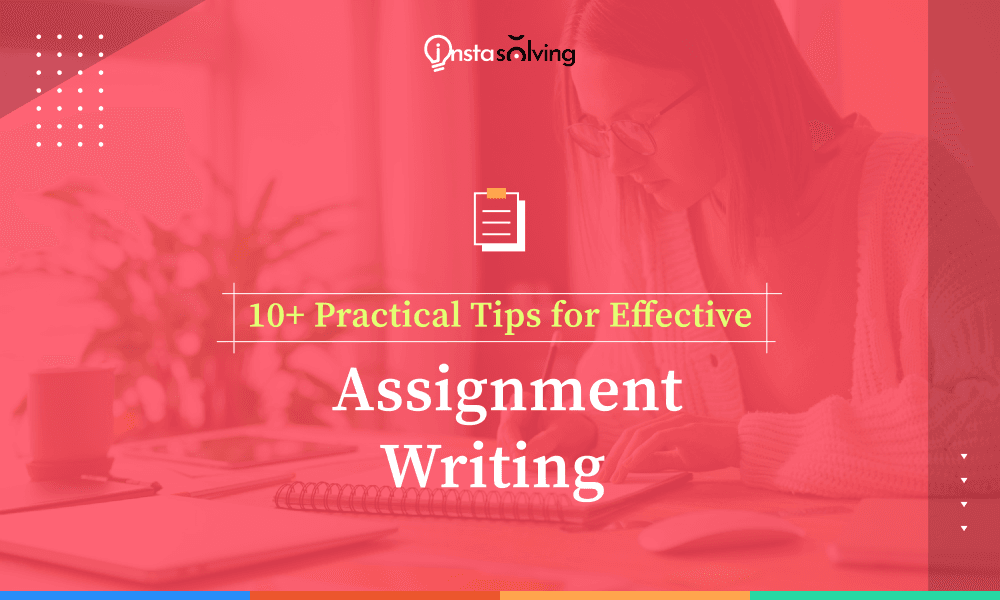
10+ Practical Tips For Effective Assignment Writing
Craft A+ essays with our Effective Assignment Writing guide – Your key to academic excellence and top-notch grades!

5 Common Assignment Writing Problems For Students
Decoding Student Struggles Insights into Common Assignment Writing Challenges and Strategies for Academic Success.

Pro-Tips For Overcoming Time Management Struggles For Assignments
Unlock success with pro tips! Conquer time management hurdles for assignments effortlessly. Elevate your productivity with expert strategies.

Unraveling the Essence of Assignments: Your Path to Academic Success
A Journey to Excellence: Understanding and Conquering Academic Assignments
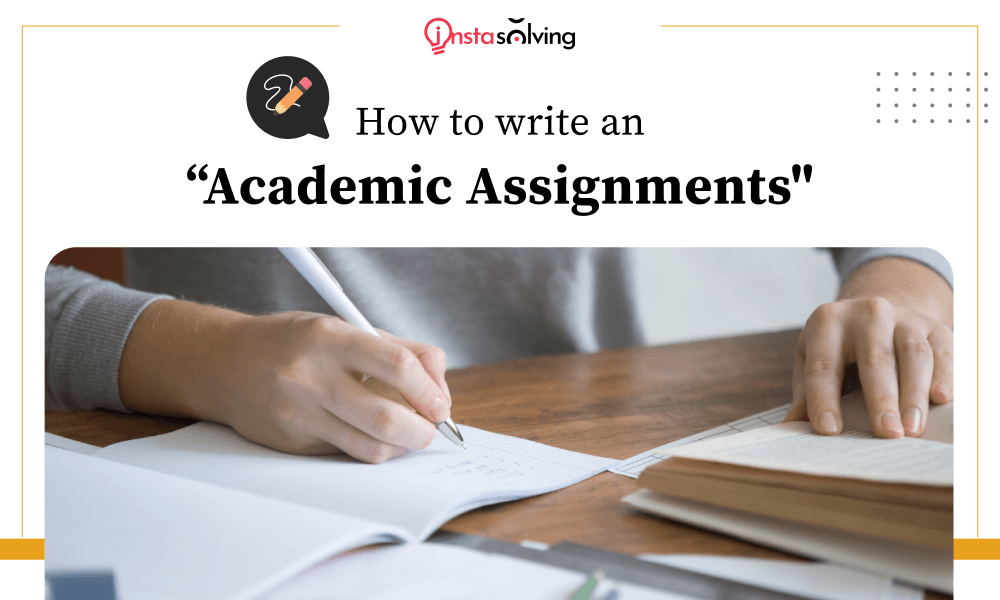
How to write an “academic assignments"
Unlocking Your Potential: Proven Techniques for Excelling in Assignments

Excel in Physics class with these 6 tips
Discover hot tips for excelling in your online physics class. Boost your understanding, ace exams, and thrive in your academic journey with expert advice.

Learn Quick Tips to Solve Math Assignment Faster
Math Made Swift: Unlock Efficiency with Quick Tips to Solve Assignments Faster. Accelerate your problem-solving skills for academic success!

Why Are Students Opting For Statistics Assignment Help?
Get expert statistics assignment help! Our professionals offer assistance with data analysis, hypothesis testing, and more. Score high grades!

Improve Your Performance with Statistics Assignment Help
Boost Your Grades with Expert Statistics Assignment Help - Enhance Your Performance Today!

Amazing Assignment Significance For Students That Blew Your Mind
Unveiling the Mind-Blowing Significance of Amazing Assignments for Students – Transformative Insights That Reshape Academic Excellence!

How Assignment Help USA Assist University Students
Elevate Your Grades with Assignment Help USA - Supporting University Students for Academic Excellence!

50+ Essay and Dissertation Assignment Topics For College Students
Exploring Diverse Dimensions: Essay and Dissertation Assignment Topics to Ignite Academic Curiosity and Foster Critical Thinking.

Using Examples in Your Assignment- Reasons & Benefits
Empower Your Academic Journey with Tailored Assignment Help Solutions - Achieve Excellence, Stress-Free!

12 Tips for writing an academic assignments
The Write Way: Strategies to Enhance Clarity and Coherence in Assignments

4 Reasons Why Students find Programming Assignment help Difficult
Maximize Success: Uncover the Top Benefits of Choosing Online Programming Assignment Help for Academic Excellence!

Expert Guidance On How to Structure An Assignment
Strategic Blueprint: Unlock Academic Success with Expert Guidance on Crafting a Well-Structured Assignment for Optimal Impact and Excellence.

How to Overcome Engineering Assignment Challenges & Master the Subject?
Conquer Engineering Assignment Challenges & Master the Subject: Expert Tips and Strategies for Academic Success

Engineering Assignment Writing From Experts To Change Your Learning Experience
Transform your learning journey with expert engineering assignment writing. Unlock new levels of understanding and excellence.

150+ Brilliant Child Development Research Topic Ideas
Unlocking Potential: Diverse Child Development Research Topics for Comprehensive Understanding and Positive Impact.

Key Steps to Writing Assignments on Accounting
Unlock Success: Mastering Accounting Assignments with Key Steps. A Comprehensive Guide to Writing and Excelling in Your Accounting Tasks.
Professional editors. Expert processing
- Get Started
- Integrations
- Writer's workshop
- Return to dashboard
Steps and tips for completing an academic assignment
Whether you’re a university student or in secondary school, you’ll inevitably be given a writing assignment. to get good grades on writing assignments, it’s important to follow a few steps as you complete the work. to help you as you complete your assignment, we’ve listed some important steps and provided some useful tips., steps for completing an assignment.
- First, carefully read the assignment. Make sure you understand what your instructor is looking for in terms of content, formatting and structure. It’s also vital that you know when the assignment is due and start working on it well before the due date. If you have any questions about the assignment, ask your instructor as soon as possible so he or she has sufficient time to give you an answer.
- Conduct any necessary research to find information to include in your assignment. Make sure you keep notes from your research, including the publication information for each source.
- Make some notes and create a draft outline of the information you need to include in the assignment. For example, if your teacher has asked you to write about Albert Einstein’s most important accomplishments, create a chronological list of those accomplishments so you don’t forget to include any. This step also helps you organize the information so it flows clearly and coherently.
- Once your draft outline is complete, begin writing your text. Some people like to start with the introduction, which lays out your topic and explains what you’re writing about. Others like to start with the body of the document, which includes the main part of the text, and then return to complete the introduction once the body is complete. If you’re not sure which approach will work best for you, try writing the introduction first. If you struggle to come up with content, switch to writing the body of the document.
- Once your introduction and the body of the document are complete, write your conclusion, which sums up everything you’ve written about so far. Remember that the conclusion should not introduce any new information or ideas that were not discussed in the body of the text.
- If your instructor requires a list of references, create a list at the end of the document and make sure you have in-text citations to each source. Make sure to follow your instructor’s preferred style guide for the citations and references.
- Before you turn the assignment in, make sure you edit and proofread the text to ensure that there are no lingering errors in the text and that the text makes sense. It might help to have someone else look over the document to point out text that isn’t clear.
Tips for completing an academic assignment
- Before you begin writing, think about where you work best. Most of us do not work well when we are distracted by loud noises, conversations, the TV, etc. Find a quiet, comfortable place to write.
- Remember that academic assignments almost always require formal academic language. Unless your teacher specifically asks you to write informally, remember to use a formal writing style. For help with formal academic writing, see our introduction to academic writing.
- Remember that each paragraph in your work should discuss one main topic or idea. You should present that idea in the first sentence of the paragraph, and all the following information in that paragraph should support the main idea of the paragraph. Don’t combine two disparate ideas into one paragraph.
You should never plagiarise another author’s work. If you get information from another source, you must acknowledge that the information came from someone else. Furthermore, you should absolutely never copy and paste text from another author into your assignment and try to submit it as your own work.
Academic proofreading
Thesis proofreading
Dissertation proofreading service
- Proofreading services
- Copy-editing services
- Editor guide (UK)
- Editor guide (US)
- Editor guide (DE)
- Writer’s workshop
- Word count tool
- Proofreading marks
- Proofreading
- Proofreading online
- Copy-editing
- Privacy policy
- Terms of use for clients
- Terms of use for editors
- Non-disclosure agreement

Choose Your Test
Sat / act prep online guides and tips, the 5 best homework help websites (free and paid).
Other High School , General Education

Listen: we know homework isn’t fun, but it is a good way to reinforce the ideas and concepts you’ve learned in class. But what if you’re really struggling with your homework assignments?
If you’ve looked online for a little extra help with your take-home assignments, you’ve probably stumbled across websites claiming to provide the homework help and answers students need to succeed . But can homework help sites really make a difference? And if so, which are the best homework help websites you can use?
Below, we answer these questions and more about homework help websites–free and paid. We’ll go over:
- The basics of homework help websites
- The cost of homework help websites
- The five best homework websites out there
- The pros and cons of using these websites for homework help
- The line between “learning” and “cheating” when using online homework help
- Tips for getting the most out of a homework help website
So let’s get started!

The Basics About Homework Help Websites–Free and Paid
Homework help websites are designed to help you complete your homework assignments, plain and simple.
What Makes a Homework Help Site Worth Using
Most of the best sites allow users to ask questions and then provide an answer (or multiple possible answers) and explanation in seconds. In some instances, you can even send a photo of a particular assignment or problem instead of typing the whole thing out!
Homework help sites also offer more than just help answering homework questions. Common services provided are Q&A with experts, educational videos, lectures, practice tests and quizzes, learning modules, math solving tools, and proofreading help. Homework help sites can also provide textbook solutions (i.e. answers to problems in tons of different textbooks your school might be using), one-on-one tutoring, and peer-to-peer platforms that allow you to discuss subjects you’re learning about with your fellow students.
And best of all, nearly all of them offer their services 24/7, including tutoring!
What You Should Should Look Out For
When it comes to homework help, there are lots–and we mean lots –of scam sites out there willing to prey on desperate students. Before you sign up for any service, make sure you read reviews to ensure you’re working with a legitimate company.
A word to the wise: the more a company advertises help that veers into the territory of cheating, the more likely it is to be a scam. The best homework help websites are going to help you learn the concepts you’ll need to successfully complete your homework on your own. (We’ll go over the difference between “homework help” and “cheating” a little later!)

You don't need a golden piggy bank to use homework help websites. Some provide low or no cost help for students like you!
How Expensive Are the Best Homework Help Websites?
First of all, just because a homework help site costs money doesn’t mean it’s a good service. Likewise, just because a homework help website is free doesn’t mean the help isn’t high quality. To find the best websites, you have to take a close look at the quality and types of information they provide!
When it comes to paid homework help services, the prices vary pretty widely depending on the amount of services you want to subscribe to. Subscriptions can cost anywhere from $2 to $150 dollars per month, with the most expensive services offering several hours of one-on-one tutoring with a subject expert per month.
The 5 Best Homework Help Websites
So, what is the best homework help website you can use? The answer is that it depends on what you need help with.
The best homework help websites are the ones that are reliable and help you learn the material. They don’t just provide answers to homework questions–they actually help you learn the material.
That’s why we’ve broken down our favorite websites into categories based on who they’re best for . For instance, the best website for people struggling with math might not work for someone who needs a little extra help with science, and vice versa.
Keep reading to find the best homework help website for you!
Best Free Homework Help Site: Khan Academy
- Price: Free!
- Best for: Practicing tough material
Not only is Khan Academy free, but it’s full of information and can be personalized to suit your needs. When you set up your account , you choose which courses you need to study, and Khan Academy sets up a personal dashboard of instructional videos, practice exercises, and quizzes –with both correct and incorrect answer explanations–so you can learn at your own pace.
As an added bonus, it covers more course topics than many other homework help sites, including several AP classes.
Runner Up: Brainly.com offers a free service that allows you to type in questions and get answers and explanations from experts. The downside is that you’re limited to two answers per question and have to watch ads.

Best Paid Homework Help Site: Chegg
- Price: $14.95 to $19.95 per month
- Best for: 24/7 homework assistance
This service has three main parts . The first is Chegg Study, which includes textbook solutions, Q&A with subject experts, flashcards, video explanations, a math solver, and writing help. The resources are thorough, and reviewers state that Chegg answers homework questions quickly and accurately no matter when you submit them.
Chegg also offers textbook rentals for students who need access to textbooks outside of their classroom. Finally, Chegg offers Internship and Career Advice for students who are preparing to graduate and may need a little extra help with the transition out of high school.
Another great feature Chegg provides is a selection of free articles geared towards helping with general life skills, like coping with stress and saving money. Chegg’s learning modules are comprehensive, and they feature solutions to the problems in tons of different textbooks in a wide variety of subjects.
Runner Up: Bartleby offers basically the same services as Chegg for $14.99 per month. The reason it didn’t rank as the best is based on customer reviews that say user questions aren’t answered quite as quickly on this site as on Chegg. Otherwise, this is also a solid choice!

Best Site for Math Homework Help: Photomath
- Price: Free (or $59.99 per year for premium services)
- Best for: Explaining solutions to math problems
This site allows you to t ake a picture of a math problem, and instantly pulls up a step-by-step solution, as well as a detailed explanation of the concept. Photomath also includes animated videos that break down mathematical concepts to help you better understand and remember them.
The basic service is free, but for an additional fee you can get extra study tools and learn additional strategies for solving common math problems.
Runner Up: KhanAcademy offers in-depth tutorials that cover complex math topics for free, but you won’t get the same tailored help (and answers!) that Photomath offers.
Best Site for English Homework Help: Princeton Review Academic Tutoring
- Price: $40 to $153 per month, depending on how many hours of tutoring you want
- Best for: Comprehensive and personalized reading and writing help
While sites like Grammarly and Sparknotes help you by either proofreading what you write via an algorithm or providing book summaries, Princeton Review’s tutors provide in-depth help with vocabulary, literature, essay writing and development, proofreading, and reading comprehension. And unlike other services, you’ll have the chance to work with a real person to get help.
The best part is that you can get on-demand English (and ESL) tutoring from experts 24/7. That means you can get help whenever you need it, even if you’re pulling an all-nighter!
This is by far the most expensive homework site on this list, so you’ll need to really think about what you need out of a homework help website before you commit. One added benefit is that the subscription covers over 80 other subjects, including AP classes, which can make it a good value if you need lots of help!

Best Site for STEM Homework Help: Studypool
- Best for: Science homework help
- Price: Varies; you’ll pay for each question you submit
When it comes to science homework help, there aren’t a ton of great resources out there. The best of the bunch is Studypool, and while it has great reviews, there are some downsides as well.
Let’s start with the good stuff. Studypool offers an interesting twist on the homework help formula. After you create a free account, you can submit your homework help questions, and tutors will submit bids to answer your questions. You’ll be able to select the tutor–and price point–that works for you, then you’ll pay to have your homework question answered. You can also pay a small fee to access notes, lectures, and other documents that top tutors have uploaded.
The downside to Studypool is that the pricing is not transparent . There’s no way to plan for how much your homework help will cost, especially if you have lots of questions! Additionally, it’s not clear how tutors are selected, so you’ll need to be cautious when you choose who you’d like to answer your homework questions.

What Are the Pros and Cons of Using Homework Help Sites?
Homework help websites can be a great resource if you’re struggling in a subject, or even if you just want to make sure that you’re really learning and understanding topics and ideas that you’re interested in. But, there are some possible drawbacks if you don’t use these sites responsibly.
We’ll go over the good–and the not-so-good–aspects of getting online homework help below.
3 Pros of Using Homework Help Websites
First, let’s take a look at the benefits.
#1: Better Grades Beyond Homework
This is a big one! Getting outside help with your studies can improve your understanding of concepts that you’re learning, which translates into better grades when you take tests or write essays.
Remember: homework is designed to help reinforce the concepts you learned in class. If you just get easy answers without learning the material behind the problems, you may not have the tools you need to be successful on your class exams…or even standardized tests you’ll need to take for college.
#2: Convenience
One of the main reasons that online homework help is appealing is because it’s flexible and convenient. You don’t have to go to a specific tutoring center while they’re open or stay after school to speak with your teacher. Instead, you can access helpful resources wherever you can access the internet, whenever you need them.
This is especially true if you tend to study at off hours because of your extracurriculars, work schedule, or family obligations. Sites that offer 24/7 tutoring can give you the extra help you need if you can’t access the free resources that are available at your school.
#3: Variety
Not everyone learns the same way. Maybe you’re more of a visual learner, but your teacher mostly does lectures. Or maybe you learn best by listening and taking notes, but you’re expected to learn something just from reading the textbook .
One of the best things about online homework help is that it comes in a variety of forms. The best homework help sites offer resources for all types of learners, including videos, practice activities, and even one-on-one discussions with real-life experts.
This variety can also be a good thing if you just don’t really resonate with the way a concept is being explained (looking at you, math textbooks!).

Not so fast. There are cons to homework help websites, too. Get to know them below!
3 Cons of Using Homework Help Websites
Now, let’s take a look at the drawbacks of online homework help.
#1: Unreliable Info
This can be a real problem. In addition to all the really good homework help sites, there are a whole lot of disreputable or unreliable sites out there. The fact of the matter is that some homework help sites don’t necessarily hire people who are experts in the subjects they’re talking about. In those cases, you may not be getting the accurate, up-to-date, and thorough information you need.
Additionally, even the great sites may not be able to answer all of your homework questions. This is especially true if the site uses an algorithm or chatbot to help students…or if you’re enrolled in an advanced or college-level course. In these cases, working with your teacher or school-provided tutors are probably your best option.
#2: No Clarification
This depends on the service you use, of course. But the majority of them provide free or low-cost help through pre-recorded videos. Watching videos or reading info online can definitely help you with your homework… but you can’t ask questions or get immediate feedback if you need it .
#3: Potential For Scamming
Like we mentioned earlier, there are a lot of homework help websites out there, and lots of them are scams. The review comments we read covered everything from outdated or wrong information, to misleading claims about the help provided, to not allowing people to cancel their service after signing up.
No matter which site you choose to use, make sure you research and read reviews before you sign up–especially if it’s a paid service!

When Does “Help” Become “Cheating”?
Admittedly, whether using homework help websites constitutes cheating is a bit of a grey area. For instance, is it “help” when a friend reads your essay for history class and corrects your grammar, or is it “cheating”? The truth is, not everyone agrees on when “help” crosses the line into “cheating .” When in doubt, it can be a good idea to check with your teacher to see what they think about a particular type of help you want to get.
That said, a general rule of thumb to keep in mind is to make sure that the assignment you turn in for credit is authentically yours . It needs to demonstrate your own thoughts and your own current abilities. Remember: the point of every homework assignment is to 1) help you learn something, and 2) show what you’ve learned.
So if a service answers questions or writes essays for you, there’s a good chance using it constitutes cheating.
Here’s an example that might help clarify the difference for you. Brainstorming essay ideas with others or looking online for inspiration is “help” as long as you write the essay yourself. Having someone read it and give you feedback about what you need to change is also help, provided you’re the one that makes the changes later.
But copying all or part of an essay you find online or having someone write (or rewrite) the whole thing for you would be “cheating.” The same is true for other subjects. Ultimately, if you’re not generating your own work or your own answers, it’s probably cheating.

5 Tips for Finding the Best Homework Help Websites for You
Now that you know some of our favorite homework help websites, free and paid, you can start doing some additional research on your own to decide which services might work best for you! Here are some top tips for choosing a homework help website.
Tip 1: Decide How You Learn Best
Before you decide which site or sites you’re going to use for homework help, y ou should figure out what kind of learning style works for you the most. Are you a visual learner? Then choose a site that uses lots of videos to help explain concepts. If you know you learn best by actually doing tasks, choose a site that provides lots of practice exercises.
Tip 2: Determine Which Subjects You Need Help With
Just because a homework help site is good overall doesn’t mean that it’s equally good for every subject. If you only need help in math, choose a site that specializes in that area. But if history is where you’re struggling, a site that specializes in math won’t be much help. So make sure to choose a site that you know provides high-quality help in the areas you need it most.
Tip 3: Decide How Much One-On-One Help You Need
This is really about cost-effectiveness. If you learn well on your own by reading and watching videos, a free site like Khan Academy is a good choice. But if you need actual tutoring, or to be able to ask questions and get personalized answers from experts, a paid site that provides that kind of service may be a better option.
Tip 4: Set a Budget
If you decide you want to go with a paid homework help website, set a budget first . The prices for sites vary wildly, and the cost to use them can add up quick.
Tip 5: Read the Reviews
Finally, it’s always a good idea to read actual reviews written by the people using these homework sites. You’ll learn the good, the bad, and the ugly of what the users’ experiences have been. This is especially true if you intend to subscribe to a paid service. You’ll want to make sure that users think it’s worth the price overall!

What’s Next?
If you want to get good grades on your homework, it’s a good idea to learn how to tackle it strategically. Our expert tips will help you get the most out of each assignment…and boost your grades in the process.
Doing well on homework assignments is just one part of getting good grades. We’ll teach you everything you need to know about getting great grades in high school in this article.
Of course, test grades can make or break your GPA, too. Here are 17 expert tips that’ll help you get the most out of your study prep before you take an exam.

Ashley Sufflé Robinson has a Ph.D. in 19th Century English Literature. As a content writer for PrepScholar, Ashley is passionate about giving college-bound students the in-depth information they need to get into the school of their dreams.
Ask a Question Below
Have any questions about this article or other topics? Ask below and we'll reply!
Improve With Our Famous Guides
- For All Students
The 5 Strategies You Must Be Using to Improve 160+ SAT Points
How to Get a Perfect 1600, by a Perfect Scorer
Series: How to Get 800 on Each SAT Section:
Score 800 on SAT Math
Score 800 on SAT Reading
Score 800 on SAT Writing
Series: How to Get to 600 on Each SAT Section:
Score 600 on SAT Math
Score 600 on SAT Reading
Score 600 on SAT Writing
Free Complete Official SAT Practice Tests
What SAT Target Score Should You Be Aiming For?
15 Strategies to Improve Your SAT Essay
The 5 Strategies You Must Be Using to Improve 4+ ACT Points
How to Get a Perfect 36 ACT, by a Perfect Scorer
Series: How to Get 36 on Each ACT Section:
36 on ACT English
36 on ACT Math
36 on ACT Reading
36 on ACT Science
Series: How to Get to 24 on Each ACT Section:
24 on ACT English
24 on ACT Math
24 on ACT Reading
24 on ACT Science
What ACT target score should you be aiming for?
ACT Vocabulary You Must Know
ACT Writing: 15 Tips to Raise Your Essay Score
How to Get Into Harvard and the Ivy League
How to Get a Perfect 4.0 GPA
How to Write an Amazing College Essay
What Exactly Are Colleges Looking For?
Is the ACT easier than the SAT? A Comprehensive Guide
Should you retake your SAT or ACT?
When should you take the SAT or ACT?
Stay Informed
Get the latest articles and test prep tips!
Looking for Graduate School Test Prep?
Check out our top-rated graduate blogs here:
GRE Online Prep Blog
GMAT Online Prep Blog
TOEFL Online Prep Blog
Holly R. "I am absolutely overjoyed and cannot thank you enough for helping me!”
4 Tips for Completing Your Homework On Time
- Study Skills
- Test Prep Strategies
- SAT Test Prep
- ACT Test Prep
- GRE Test Prep
- LSAT Test Prep
- Certifications
- Homework Help
- Private School
- College Admissions
- College Life
- Graduate School
- Business School
- Distance Learning
:max_bytes(150000):strip_icc():format(webp)/kr01-56a946be5f9b58b7d0f9d8d0.jpg)
- B.A., English, University of Michigan
Homework, a necessary evil according to many teachers, has a lot of students tied up in knots. Some students can never seem to get things turned in on time. In fact, many students do not even realize that they have homework until a friend from class texts them or they overhear someone in the halls talking about Ms. So-and-so's terrible, no-good, awful, horrifying worksheet for Chemistry that is due the next day. These five tips for completing your homework on time, however, should help you get that homework finished on time.
Tip 1: Rely On a Planning System
Most of you by now are well acquainted with a homework planner. It has the dates, the school subjects you are taking, and a whole lot of blank space to write down your homework assignments. Use these planners if you have them. Writing with an actual pencil or pen may seem almost archaic what with technology virtually doing everything for us, but the kinesthetic movement of writing down an assignment into one of those little squares (Language Arts test tomorrow - STUDY TONIGHT), will actually help solidify that homework in your brain.
Plus, when you are packing up to go home at the end of the school day, all you have to do is open up that planner to see which books, folders, and binders need to go home with you so you will not miss out anything that you need to do that evening.
Some people hate using planners. They'd rather walk on a pile of crushed glass than actually write something down in a planner. That's quite all right. One student kept a wadded up piece of paper in his pocket where he'd scrawl his assignments. It worked for him, so it was fine. For those of you not keen on planners or crumpled up notes, your phone can come in really handy. Just download a productivity app and type your assignments in there. Or, keep track of all the work due in the notes section of your phone. Or, snap a picture of the homework board in each teacher's class before you head out into the hallway. Or, if you are really dead-set against anything planner-related, then just send yourself a text after each class with your homework assignments for the night.
No matter which planning system you prefer, use it. Check off each item once you get it in your backpack. Your brain can only process so much information at a time, so you absolutely must write your homework down if you plan to complete it on time.
Tip 2: Prioritize Your Homework Assignments
All assignments are not created equal. It's strongly recommended you use a prioritizing system when you sit down at home with your homework. Try a system a little something like this:
- Examples: Studying for a major test coming up tomorrow. Finishing a major project due tomorrow. Writing an essay worth a LOT of points that is due tomorrow.
- Examples: Studying for a quiz coming up tomorrow. Completing a homework sheet that is due tomorrow. Reading a chapter that is due tomorrow.
- Examples: Studying for a spelling test that will occur on Friday. Writing a blog and posting it on the class board by Friday. Finish a book upon which you will take a quiz on Friday.
- Examples: Reviewing chapters for the midterm exam. Working on an on-going project, research paper, or long assignment due at the end of the quarter. Completing a packet that isn't due for two weeks.
Once you've prioritized the work you have to do, complete all the 1's first, then the 2's, moving down as you go. That way, if you find yourself pressed for time because Great-Grandma decided to stop over for family dinner and your mom insisted you spend the evening playing bridge with her despite the fact that you have hours of homework ahead of you, then you will not have missed anything vitally important to your grade.
Tip 3: Get the Worst Assignment Over With First
So, maybe you absolutely hate writing essays (But, why, though when all you have to do is follow these essay tips? ) and you have a major essay staring you in the face that must be completed before tomorrow. You also have to study for a major math test, complete a social studies blog by Friday, study for the ACT next month, and finish up your science worksheet from class. Your "1" assignments would be the essay and the math test. Your "2" assignment is the science worksheet, the "3" assignment is that blog, and the "4" assignment is studying for the ACT.
Ordinarily, you would start with the science worksheet because you love science, but that would be a big mistake. Start with those "1" assignments and knock out that essay first. Why? Because you hate it. And completing the worst assignment first gets it off your mind, out of your homework cache, and makes everything that comes after it appears to be really, really easy. It will be an absolute joy to complete that science worksheet once you have written the essay. Why rob yourself of joy?
Then, once you've completed the stuff due first, you can focus on putting in a little bit of time on the ACT. Easy peasy.
Tip 4: Take Planned Breaks
Some people believe that sitting down to complete homework means that you literally park your behind in a chair and you don't move it for the next four thousand hours or so. That is one of the worst study ideas in history. Your brain only has the capacity to stay focused for about 45 minutes (maybe even less for some of you) before it goes on the fritz and starts wanting to make you get up and dance the Roger Rabbit. So, schedule your study time with breaks actually built in . Work for 45 minutes, then take a 10-minute break to do whatever it is people your age like to do. Then, rinse and repeat. It looks a little something like this:
Homework Time:
- 45 minutes: Work on "1" assignments, starting with the absolute worst.
- 10 minutes: Get a snack, play Pokemon Go!, surf Instagram
- 45 minutes: Work on "1" assignments again. You know you didn't finish.
- 10 minutes: Do some jumping jacks, dance the Macarena, polish your nails.
- 45 minutes: Work on "2" assignments and maybe even finish with any 3s and 4s. Put everything in your backpack.
Completing your homework on time is a learned skill. It requires some discipline and not everyone is naturally disciplined. So, you have to practice checking that you have everything you need for homework when you are still at school, prioritizing your work, plunging into the assignments you loathe, and taking planned breaks. Isn't your grade worth it?
You bet it is.
- Tips for Remembering Homework Assignments
- Organize Your Homework With Color Coded Supplies
- How to Get Your Homework Done in College
- Study Habits That Can Improve Grades and Performance
- Organize Your Time With a Day Planner
- Homework Guidelines for Elementary and Middle School Teachers
- Study Tips for Middle School Students
- Collecting Homework in the Classroom
- Late Work Policy for Teachers Example
- Tips for Studying for a Midterm Exam
- Essential Strategies to Help You Become an Outstanding Student
- Top 10 Healthy Homework Habits
- How are College Academics Different from High School?
- Time Management Exercise
- The Case for the Importance of Taking Notes
- How to Deal With Late Work and Makeup Work
Teaching, Learning, & Professional Development Center
- Teaching Resources
- TLPDC Teaching Resources
How Do I Create Meaningful and Effective Assignments?
Prepared by allison boye, ph.d. teaching, learning, and professional development center.
Assessment is a necessary part of the teaching and learning process, helping us measure whether our students have really learned what we want them to learn. While exams and quizzes are certainly favorite and useful methods of assessment, out of class assignments (written or otherwise) can offer similar insights into our students' learning. And just as creating a reliable test takes thoughtfulness and skill, so does creating meaningful and effective assignments. Undoubtedly, many instructors have been on the receiving end of disappointing student work, left wondering what went wrong… and often, those problems can be remedied in the future by some simple fine-tuning of the original assignment. This paper will take a look at some important elements to consider when developing assignments, and offer some easy approaches to creating a valuable assessment experience for all involved.
First Things First…
Before assigning any major tasks to students, it is imperative that you first define a few things for yourself as the instructor:
- Your goals for the assignment . Why are you assigning this project, and what do you hope your students will gain from completing it? What knowledge, skills, and abilities do you aim to measure with this assignment? Creating assignments is a major part of overall course design, and every project you assign should clearly align with your goals for the course in general. For instance, if you want your students to demonstrate critical thinking, perhaps asking them to simply summarize an article is not the best match for that goal; a more appropriate option might be to ask for an analysis of a controversial issue in the discipline. Ultimately, the connection between the assignment and its purpose should be clear to both you and your students to ensure that it is fulfilling the desired goals and doesn't seem like “busy work.” For some ideas about what kinds of assignments match certain learning goals, take a look at this page from DePaul University's Teaching Commons.
- Have they experienced “socialization” in the culture of your discipline (Flaxman, 2005)? Are they familiar with any conventions you might want them to know? In other words, do they know the “language” of your discipline, generally accepted style guidelines, or research protocols?
- Do they know how to conduct research? Do they know the proper style format, documentation style, acceptable resources, etc.? Do they know how to use the library (Fitzpatrick, 1989) or evaluate resources?
- What kinds of writing or work have they previously engaged in? For instance, have they completed long, formal writing assignments or research projects before? Have they ever engaged in analysis, reflection, or argumentation? Have they completed group assignments before? Do they know how to write a literature review or scientific report?
In his book Engaging Ideas (1996), John Bean provides a great list of questions to help instructors focus on their main teaching goals when creating an assignment (p.78):
1. What are the main units/modules in my course?
2. What are my main learning objectives for each module and for the course?
3. What thinking skills am I trying to develop within each unit and throughout the course?
4. What are the most difficult aspects of my course for students?
5. If I could change my students' study habits, what would I most like to change?
6. What difference do I want my course to make in my students' lives?
What your students need to know
Once you have determined your own goals for the assignment and the levels of your students, you can begin creating your assignment. However, when introducing your assignment to your students, there are several things you will need to clearly outline for them in order to ensure the most successful assignments possible.
- First, you will need to articulate the purpose of the assignment . Even though you know why the assignment is important and what it is meant to accomplish, you cannot assume that your students will intuit that purpose. Your students will appreciate an understanding of how the assignment fits into the larger goals of the course and what they will learn from the process (Hass & Osborn, 2007). Being transparent with your students and explaining why you are asking them to complete a given assignment can ultimately help motivate them to complete the assignment more thoughtfully.
- If you are asking your students to complete a writing assignment, you should define for them the “rhetorical or cognitive mode/s” you want them to employ in their writing (Flaxman, 2005). In other words, use precise verbs that communicate whether you are asking them to analyze, argue, describe, inform, etc. (Verbs like “explore” or “comment on” can be too vague and cause confusion.) Provide them with a specific task to complete, such as a problem to solve, a question to answer, or an argument to support. For those who want assignments to lead to top-down, thesis-driven writing, John Bean (1996) suggests presenting a proposition that students must defend or refute, or a problem that demands a thesis answer.
- It is also a good idea to define the audience you want your students to address with their assignment, if possible – especially with writing assignments. Otherwise, students will address only the instructor, often assuming little requires explanation or development (Hedengren, 2004; MIT, 1999). Further, asking students to address the instructor, who typically knows more about the topic than the student, places the student in an unnatural rhetorical position. Instead, you might consider asking your students to prepare their assignments for alternative audiences such as other students who missed last week's classes, a group that opposes their position, or people reading a popular magazine or newspaper. In fact, a study by Bean (1996) indicated the students often appreciate and enjoy assignments that vary elements such as audience or rhetorical context, so don't be afraid to get creative!
- Obviously, you will also need to articulate clearly the logistics or “business aspects” of the assignment . In other words, be explicit with your students about required elements such as the format, length, documentation style, writing style (formal or informal?), and deadlines. One caveat, however: do not allow the logistics of the paper take precedence over the content in your assignment description; if you spend all of your time describing these things, students might suspect that is all you care about in their execution of the assignment.
- Finally, you should clarify your evaluation criteria for the assignment. What elements of content are most important? Will you grade holistically or weight features separately? How much weight will be given to individual elements, etc? Another precaution to take when defining requirements for your students is to take care that your instructions and rubric also do not overshadow the content; prescribing too rigidly each element of an assignment can limit students' freedom to explore and discover. According to Beth Finch Hedengren, “A good assignment provides the purpose and guidelines… without dictating exactly what to say” (2004, p. 27). If you decide to utilize a grading rubric, be sure to provide that to the students along with the assignment description, prior to their completion of the assignment.
A great way to get students engaged with an assignment and build buy-in is to encourage their collaboration on its design and/or on the grading criteria (Hudd, 2003). In his article “Conducting Writing Assignments,” Richard Leahy (2002) offers a few ideas for building in said collaboration:
• Ask the students to develop the grading scale themselves from scratch, starting with choosing the categories.
• Set the grading categories yourself, but ask the students to help write the descriptions.
• Draft the complete grading scale yourself, then give it to your students for review and suggestions.
A Few Do's and Don'ts…
Determining your goals for the assignment and its essential logistics is a good start to creating an effective assignment. However, there are a few more simple factors to consider in your final design. First, here are a few things you should do :
- Do provide detail in your assignment description . Research has shown that students frequently prefer some guiding constraints when completing assignments (Bean, 1996), and that more detail (within reason) can lead to more successful student responses. One idea is to provide students with physical assignment handouts , in addition to or instead of a simple description in a syllabus. This can meet the needs of concrete learners and give them something tangible to refer to. Likewise, it is often beneficial to make explicit for students the process or steps necessary to complete an assignment, given that students – especially younger ones – might need guidance in planning and time management (MIT, 1999).
- Do use open-ended questions. The most effective and challenging assignments focus on questions that lead students to thinking and explaining, rather than simple yes or no answers, whether explicitly part of the assignment description or in the brainstorming heuristics (Gardner, 2005).
- Do direct students to appropriate available resources . Giving students pointers about other venues for assistance can help them get started on the right track independently. These kinds of suggestions might include information about campus resources such as the University Writing Center or discipline-specific librarians, suggesting specific journals or books, or even sections of their textbook, or providing them with lists of research ideas or links to acceptable websites.
- Do consider providing models – both successful and unsuccessful models (Miller, 2007). These models could be provided by past students, or models you have created yourself. You could even ask students to evaluate the models themselves using the determined evaluation criteria, helping them to visualize the final product, think critically about how to complete the assignment, and ideally, recognize success in their own work.
- Do consider including a way for students to make the assignment their own. In their study, Hass and Osborn (2007) confirmed the importance of personal engagement for students when completing an assignment. Indeed, students will be more engaged in an assignment if it is personally meaningful, practical, or purposeful beyond the classroom. You might think of ways to encourage students to tap into their own experiences or curiosities, to solve or explore a real problem, or connect to the larger community. Offering variety in assignment selection can also help students feel more individualized, creative, and in control.
- If your assignment is substantial or long, do consider sequencing it. Far too often, assignments are given as one-shot final products that receive grades at the end of the semester, eternally abandoned by the student. By sequencing a large assignment, or essentially breaking it down into a systematic approach consisting of interconnected smaller elements (such as a project proposal, an annotated bibliography, or a rough draft, or a series of mini-assignments related to the longer assignment), you can encourage thoughtfulness, complexity, and thoroughness in your students, as well as emphasize process over final product.
Next are a few elements to avoid in your assignments:
- Do not ask too many questions in your assignment. In an effort to challenge students, instructors often err in the other direction, asking more questions than students can reasonably address in a single assignment without losing focus. Offering an overly specific “checklist” prompt often leads to externally organized papers, in which inexperienced students “slavishly follow the checklist instead of integrating their ideas into more organically-discovered structure” (Flaxman, 2005).
- Do not expect or suggest that there is an “ideal” response to the assignment. A common error for instructors is to dictate content of an assignment too rigidly, or to imply that there is a single correct response or a specific conclusion to reach, either explicitly or implicitly (Flaxman, 2005). Undoubtedly, students do not appreciate feeling as if they must read an instructor's mind to complete an assignment successfully, or that their own ideas have nowhere to go, and can lose motivation as a result. Similarly, avoid assignments that simply ask for regurgitation (Miller, 2007). Again, the best assignments invite students to engage in critical thinking, not just reproduce lectures or readings.
- Do not provide vague or confusing commands . Do students know what you mean when they are asked to “examine” or “discuss” a topic? Return to what you determined about your students' experiences and levels to help you decide what directions will make the most sense to them and what will require more explanation or guidance, and avoid verbiage that might confound them.
- Do not impose impossible time restraints or require the use of insufficient resources for completion of the assignment. For instance, if you are asking all of your students to use the same resource, ensure that there are enough copies available for all students to access – or at least put one copy on reserve in the library. Likewise, make sure that you are providing your students with ample time to locate resources and effectively complete the assignment (Fitzpatrick, 1989).
The assignments we give to students don't simply have to be research papers or reports. There are many options for effective yet creative ways to assess your students' learning! Here are just a few:
Journals, Posters, Portfolios, Letters, Brochures, Management plans, Editorials, Instruction Manuals, Imitations of a text, Case studies, Debates, News release, Dialogues, Videos, Collages, Plays, Power Point presentations
Ultimately, the success of student responses to an assignment often rests on the instructor's deliberate design of the assignment. By being purposeful and thoughtful from the beginning, you can ensure that your assignments will not only serve as effective assessment methods, but also engage and delight your students. If you would like further help in constructing or revising an assignment, the Teaching, Learning, and Professional Development Center is glad to offer individual consultations. In addition, look into some of the resources provided below.
Online Resources
“Creating Effective Assignments” http://www.unh.edu/teaching-excellence/resources/Assignments.htm This site, from the University of New Hampshire's Center for Excellence in Teaching and Learning, provides a brief overview of effective assignment design, with a focus on determining and communicating goals and expectations.
Gardner, T. (2005, June 12). Ten Tips for Designing Writing Assignments. Traci's Lists of Ten. http://www.tengrrl.com/tens/034.shtml This is a brief yet useful list of tips for assignment design, prepared by a writing teacher and curriculum developer for the National Council of Teachers of English . The website will also link you to several other lists of “ten tips” related to literacy pedagogy.
“How to Create Effective Assignments for College Students.” http:// tilt.colostate.edu/retreat/2011/zimmerman.pdf This PDF is a simplified bulleted list, prepared by Dr. Toni Zimmerman from Colorado State University, offering some helpful ideas for coming up with creative assignments.
“Learner-Centered Assessment” http://cte.uwaterloo.ca/teaching_resources/tips/learner_centered_assessment.html From the Centre for Teaching Excellence at the University of Waterloo, this is a short list of suggestions for the process of designing an assessment with your students' interests in mind. “Matching Learning Goals to Assignment Types.” http://teachingcommons.depaul.edu/How_to/design_assignments/assignments_learning_goals.html This is a great page from DePaul University's Teaching Commons, providing a chart that helps instructors match assignments with learning goals.
Additional References Bean, J.C. (1996). Engaging ideas: The professor's guide to integrating writing, critical thinking, and active learning in the classroom . San Francisco: Jossey-Bass.
Fitzpatrick, R. (1989). Research and writing assignments that reduce fear lead to better papers and more confident students. Writing Across the Curriculum , 3.2, pp. 15 – 24.
Flaxman, R. (2005). Creating meaningful writing assignments. The Teaching Exchange . Retrieved Jan. 9, 2008 from http://www.brown.edu/Administration/Sheridan_Center/pubs/teachingExchange/jan2005/01_flaxman.pdf
Hass, M. & Osborn, J. (2007, August 13). An emic view of student writing and the writing process. Across the Disciplines, 4.
Hedengren, B.F. (2004). A TA's guide to teaching writing in all disciplines . Boston: Bedford/St. Martin's.
Hudd, S. S. (2003, April). Syllabus under construction: Involving students in the creation of class assignments. Teaching Sociology , 31, pp. 195 – 202.
Leahy, R. (2002). Conducting writing assignments. College Teaching , 50.2, pp. 50 – 54.
Miller, H. (2007). Designing effective writing assignments. Teaching with writing . University of Minnesota Center for Writing. Retrieved Jan. 9, 2008, from http://writing.umn.edu/tww/assignments/designing.html
MIT Online Writing and Communication Center (1999). Creating Writing Assignments. Retrieved January 9, 2008 from http://web.mit.edu/writing/Faculty/createeffective.html .
Contact TTU

Task Completion Email To Manager (Samples)
- March 9, 2023
- Corporate Emails

You or your entire team just completed an assigned project and you need to alert your manager. This would be easy if you were using a project management tool that would alert them of project completion.
But in cases where your company isn’t using a project management tool, you’d need to send your manager an email to inform them of the project’s completion.
We’re here to simplify the job by providing you with professional templates that you can leverage to make your job easier.
You simply need to modify these templates and then forward them to your manager. We’ve also included some tips that would help you whenever you need to email your manager.
Clear Reasons
Clear subject line, use proper name, use work email, keep it concise, easy to understand, end formally, template 1: project completion notice, template 2: team project completion notice, template 3: project completion notice, tips for emailing your boss.
While tools like Slack and Teams are leveraged for easier communication across organizations worldwide, emails continue to be used in these organizations, especially when communicating with a supervisor over formal correspondence.
But unlike sending emails to coworkers where you can be informal and not worry about mistakes, you should be careful when writing to your Boss. Let’s look at a few things to keep in mind.
Your boss is probably keeping track of multiple projects and may not easily remember the exact project you’re referring to. It’s advisable to specify the exact project name so they know exactly which project you’re referring to.
If there’s a deadline for the project that you were supposed to meet, make sure you include that in the email to your manager.
If the project is in phases, you should let them know exactly which phase of the project you’ve completed.
While you would not be able to include all relevant information in the subject line of the email, it should present the general purpose of the email within a few words.
This helps your boss or supervisor locate the email, understand the possible content even before reading the full message and finally ascertain the importance and urgency of the email.
After all, your boss would most likely have a busy schedule. A clear subject line would help them identify the urgency of the email especially when they have a boatload of work to get done. Examples: {{ Project Name }} Project Completed
Coming down to the body of the email, you should identify the name your boss wishes for you or the general employee body to call them.
If they prefer to be addressed by their first names, you should address them as such. On the other hand, if you aren’t sure how they want to be addressed, you can either ask your colleagues or simply use your boss’ surname.
Keep in mind your workplace culture at this point. Some workplaces encourage informal communication between all members of the organization. For informal workplaces, you start with: Good {{ morning/afternoon/evening }} {{ Boss’ firstname }} Hi {{ Boss’ firstname }} In the case of a very formal workplace where you aren’t sure of the best way to address your boss, you can simply start with: Dear {{ Mr. /Mrs /Ms. Surname }} Hello {{ Mr. /Mrs /Ms. Surname }}
Maybe something happened at the workplace that you didn’t like or there’s something you find annoying. You should always mind your tone in your professional emails.
It doesn’t matter whether the company’s doing something you’re unhappy with, you should always mind the tone of your communication. If you sound angry, your Boss is less likely to mind your request or even finish reading your email.
Refrain from contacting your boss through your personal email. Most organizations implement some form of spam filter that may flag personal emails as spam.
The last thing anyone wants is to send an urgent message to their boss only to find out days later that they never got the email. Emails that come through the company emails are whitelisted ensuring that your boss receives them inside their inbox.
This is why most organizations provide their employees with company emails for communication within the company as well as correspondence with external companies.
Your boss probably receives loads of emails daily. The last thing they want to do is to spend precious time reading through a long email to determine its content.
No matter how important your email may be, your boss is not likely to spend 30 minutes trying to understand its content. It’s advisable to use short and clear wording to easily convey the content of your message.
No one likes reading terrible grammar, especially in a professional setting. It’s advisable to proofread your email to identify any grammatical errors before sending it to your boss.
Tools like Grammarly are readily available to help identify errors in your writing. Keep in mind that these tools aren’t perfect. So manually proofreading your email can further enhance your message.
On the other hand, poor grammar could give your boss some laughs. But keep in mind that others are bound to join in.
Your boss most likely receives tens or even hundreds of emails daily, especially in the case of larger organizations. Ensure that your email is easy to understand within the shortest amount of time.
To determine this, you can ask a colleague or friend to skim through the email to test whether it’s easy to understand and adequately presents the necessary information.
At this point, you can thank your boss for taking the time to review your request and then reiterate any relevant information before signing off.
Example: Thank you for your time and attention.
Official emails to your boss should be signed off with your official signature which includes your full name, job title, department if applicable, and contact details when available.
This can be easy if you’ve already created your signature template for your company email. The system would automatically include your signature in every email.
If you haven’t created a signature template for your email, you should manually include this in your email to your boss.
It can be something like this: Sincerely, {{ Fullname }} {{ Department if applicable }} {{ Job role/title }} {{ Contact details (optional) }}
Sample Task Completion Emails To Manager
Email subject.
Project Completion Notice – {{ Project Name }}
Project Completion – {{ Project Name }}
Hi there and welcome to UnitWriter. My name's Chris, an expert in crafting effective email templates for all occasions. I created this blog to share my knowledge, by offering tips and templates to help get you started on your emails. Hope it's been helpful
Related Posts

Goodbye Email To Clients
- September 20, 2023

Sample Emails To Boss About Surgery

Sample Emails Referring A Friend For A Job
- May 26, 2023
Leave a Reply Cancel Reply
Your email address will not be published. Required fields are marked *
Name *
Email *
Add Comment *
Save my name, email, and website in this browser for the next time I comment.
Post Comment
Purdue Online Writing Lab Purdue OWL® College of Liberal Arts
Understanding Writing Assignments

Welcome to the Purdue OWL
This page is brought to you by the OWL at Purdue University. When printing this page, you must include the entire legal notice.
Copyright ©1995-2018 by The Writing Lab & The OWL at Purdue and Purdue University. All rights reserved. This material may not be published, reproduced, broadcast, rewritten, or redistributed without permission. Use of this site constitutes acceptance of our terms and conditions of fair use.
How to Decipher the Paper Assignment
Many instructors write their assignment prompts differently. By following a few steps, you can better understand the requirements for the assignment. The best way, as always, is to ask the instructor about anything confusing.
- Read the prompt the entire way through once. This gives you an overall view of what is going on.
- Underline or circle the portions that you absolutely must know. This information may include due date, research (source) requirements, page length, and format (MLA, APA, CMS).
- Underline or circle important phrases. You should know your instructor at least a little by now - what phrases do they use in class? Does he repeatedly say a specific word? If these are in the prompt, you know the instructor wants you to use them in the assignment.
- Think about how you will address the prompt. The prompt contains clues on how to write the assignment. Your instructor will often describe the ideas they want discussed either in questions, in bullet points, or in the text of the prompt. Think about each of these sentences and number them so that you can write a paragraph or section of your essay on that portion if necessary.
- Rank ideas in descending order, from most important to least important. Instructors may include more questions or talking points than you can cover in your assignment, so rank them in the order you think is more important. One area of the prompt may be more interesting to you than another.
- Ask your instructor questions if you have any.
After you are finished with these steps, ask yourself the following:
- What is the purpose of this assignment? Is my purpose to provide information without forming an argument, to construct an argument based on research, or analyze a poem and discuss its imagery?
- Who is my audience? Is my instructor my only audience? Who else might read this? Will it be posted online? What are my readers' needs and expectations?
- What resources do I need to begin work? Do I need to conduct literature (hermeneutic or historical) research, or do I need to review important literature on the topic and then conduct empirical research, such as a survey or an observation? How many sources are required?
- Who - beyond my instructor - can I contact to help me if I have questions? Do you have a writing lab or student service center that offers tutorials in writing?
(Notes on prompts made in blue )
Poster or Song Analysis: Poster or Song? Poster!
Goals : To systematically consider the rhetorical choices made in either a poster or a song. She says that all the time.
Things to Consider: ah- talking points
- how the poster addresses its audience and is affected by context I'll do this first - 1.
- general layout, use of color, contours of light and shade, etc.
- use of contrast, alignment, repetition, and proximity C.A.R.P. They say that, too. I'll do this third - 3.
- the point of view the viewer is invited to take, poses of figures in the poster, etc. any text that may be present
- possible cultural ramifications or social issues that have bearing I'll cover this second - 2.
- ethical implications
- how the poster affects us emotionally, or what mood it evokes
- the poster's implicit argument and its effectiveness said that was important in class, so I'll discuss this last - 4.
- how the song addresses its audience
- lyrics: how they rhyme, repeat, what they say
- use of music, tempo, different instruments
- possible cultural ramifications or social issues that have bearing
- emotional effects
- the implicit argument and its effectiveness
These thinking points are not a step-by-step guideline on how to write your paper; instead, they are various means through which you can approach the subject. I do expect to see at least a few of them addressed, and there are other aspects that may be pertinent to your choice that have not been included in these lists. You will want to find a central idea and base your argument around that. Additionally, you must include a copy of the poster or song that you are working with. Really important!
I will be your audience. This is a formal paper, and you should use academic conventions throughout.
Length: 4 pages Format: Typed, double-spaced, 10-12 point Times New Roman, 1 inch margins I need to remember the format stuff. I messed this up last time =(
Academic Argument Essay
5-7 pages, Times New Roman 12 pt. font, 1 inch margins.
Minimum of five cited sources: 3 must be from academic journals or books
- Design Plan due: Thurs. 10/19
- Rough Draft due: Monday 10/30
- Final Draft due: Thurs. 11/9
Remember this! I missed the deadline last time
The design plan is simply a statement of purpose, as described on pages 40-41 of the book, and an outline. The outline may be formal, as we discussed in class, or a printout of an Open Mind project. It must be a minimum of 1 page typed information, plus 1 page outline.
This project is an expansion of your opinion editorial. While you should avoid repeating any of your exact phrases from Project 2, you may reuse some of the same ideas. Your topic should be similar. You must use research to support your position, and you must also demonstrate a fairly thorough knowledge of any opposing position(s). 2 things to do - my position and the opposite.
Your essay should begin with an introduction that encapsulates your topic and indicates 1 the general trajectory of your argument. You need to have a discernable thesis that appears early in your paper. Your conclusion should restate the thesis in different words, 2 and then draw some additional meaningful analysis out of the developments of your argument. Think of this as a "so what" factor. What are some implications for the future, relating to your topic? What does all this (what you have argued) mean for society, or for the section of it to which your argument pertains? A good conclusion moves outside the topic in the paper and deals with a larger issue.
You should spend at least one paragraph acknowledging and describing the opposing position in a manner that is respectful and honestly representative of the opposition’s 3 views. The counterargument does not need to occur in a certain area, but generally begins or ends your argument. Asserting and attempting to prove each aspect of your argument’s structure should comprise the majority of your paper. Ask yourself what your argument assumes and what must be proven in order to validate your claims. Then go step-by-step, paragraph-by-paragraph, addressing each facet of your position. Most important part!
Finally, pay attention to readability . Just because this is a research paper does not mean that it has to be boring. Use examples and allow your opinion to show through word choice and tone. Proofread before you turn in the paper. Your audience is generally the academic community and specifically me, as a representative of that community. Ok, They want this to be easy to read, to contain examples I find, and they want it to be grammatically correct. I can visit the tutoring center if I get stuck, or I can email the OWL Email Tutors short questions if I have any more problems.
- Help Center
- Assignments
- Privacy Policy
- Terms of Service
- Submit feedback
Learn how Assignments works
Assignments is an add-on application for learning management systems (LMSs) to help you distribute, analyze, and grade student work with Google Workspace for Education.
For file submissions, Assignments make Google Docs, Google Sheets, Google Slides, and Google Drive compatible with your LMS. You can use Assignments to save time distributing and grading student work, and analyze student submissions with originality reports to ensure authenticity.
You use Assignments as a Learning Tools Interoperability (LTI) tool integrated within your LMS. It works with any LMS that supports LTI version 1.1 or higher, such as Canvas, Schoology, Blackboard, Moodle, and others.
Adding Assignments to your LMS might require assistance from your LMS administrator. If you have never set up an add-on application or external tool for your LMS before, talk to your IT or LMS admin about setting up Assignments in Canvas, Schoology, or another LMS.
Get started with Assignments
Assignments workflow
Step 1: instructor creates an assignment.
- (Required) Setting the point value
- (Optional) Setting the due date
- (Optional) Adding a grading rubric
- (Optional) Attaching assignment files to make a copy for each student to edit and submit
- (Optional) Enabling originality reports
Step 2: Students submit their assignments
- Google Docs, Sheets, Slides, Sites, and Drawings
- Microsoft®️ Word®️, Excel®️, or PowerPoint®️
- Image files
- Video files (WEBM, MPEG4, 3GPP, MOV, AVI, MPEG-PS, WMV, FLV, OGG)
- They no longer have edit or comment access to their original file.
- Assignments makes a copy of the submitted file and saves it to the student's Drive.
For more details, go to How instructors and students share files .
Step 3: Instructor grades and returns assignments
- Ownership of the file returns to the student.
- Assignments archives a copy of the graded file and saves it to the instructor's Drive.
- Grades are saved to the LMS grade book.
General FAQ
Does my organization need google workspace for education to use assignments, where and in what languages is assignments available, how much does assignments cost, what browsers are supported, does assignments work on mobile devices, is assignments built for accessibility, grading faq, does assignments have plagiarism detection, does assignments support rubric grading, can i save draft grades or feedback outside the student’s view, can classwork be returned individually or all at once.
- Leave draft grades and overall feedback.
- Return to the list of students.
- Check the boxes for all the students whose assignments you want to return.
- Click Return .
Can I return classwork without a grade?
Can returned classwork be resubmitted or regraded.
- To provide context for giving a new grade, the previous grade is displayed next to the grade field. Only the most recent grade syncs to the LMS.
- Previous overall feedback is displayed and new overall feedback open in a separate text box.
Can co-instructors grade assignments?
Do grades sync to the lms, class management faqs, can instructors see all their linked courses & assignments, can instructors delete courses & assignments.
Instructors who own courses can delete courses and assignments. Learn how to delete courses and assignments .
Does Assignments support group assignments?
- Tell each group to create a Google Doc and share it with group members for editing.
- Have the owner of the file submit the assignment for grading.
- Grade the assignment, leaving overall feedback as a margin comment or suggestion. Tip : The overall feedback field is visible only to the owner of the file and not to the group.
- In your grade book, record the grade for the other group members.
Does Assignments support peer review of assignments?
- Ask your students to start their assignments in Docs.
- Tell students to share their files with their peer reviewer.
- In Docs, peer reviewers leave margin comments and suggestions.
- Have students turn in their assignments, leaving in the reviewer’s comments and suggestions.Alternatively, students can review, implement, and resolve reviewer comments and instructors can view version history.
- Grade the assignments.
- (Optional) Record a separate grade for peer reviews.
Will Assignments work in a course copied in my LMS?
- Total points
- Settings for originality reports
- Attachments
- Use Assignments LTI version 1.3 for best results.
- Copied assignments can only be opened by students after an instructor links the Assignment to their account. Learn about linking your account to Assignments .
- Make sure the person who copies the course is in the same Google Workspace for Education organization as the course creator or is on the organization’s allow list. Learn more about how to manage your organization’s allow lists .
- Don’t edit or delete the original assignment or its attachments.
Need more help?
Try these next steps:.

Want to create or adapt books like this? Learn more about how Pressbooks supports open publishing practices.
Types of Assignments
Cristy Bartlett and Kate Derrington

Introduction
As discussed in the previous chapter, assignments are a common method of assessment at university. You may encounter many assignments over your years of study, yet some will look quite different from others. By recognising different types of assignments and understanding the purpose of the task, you can direct your writing skills effectively to meet task requirements. This chapter draws on the skills from the previous chapter, and extends the discussion, showing you where to aim with different types of assignments.
The chapter begins by exploring the popular essay assignment, with its two common categories, analytical and argumentative essays. It then examines assignments requiring case study responses , as often encountered in fields such as health or business. This is followed by a discussion of assignments seeking a report (such as a scientific report) and reflective writing assignments, common in nursing, education and human services. The chapter concludes with an examination of annotated bibliographies and literature reviews. The chapter also has a selection of templates and examples throughout to enhance your understanding and improve the efficacy of your assignment writing skills.
Different Types of Written Assignments
At university, an essay is a common form of assessment. In the previous chapter Writing Assignments we discussed what was meant by showing academic writing in your assignments. It is important that you consider these aspects of structure, tone and language when writing an essay.
Components of an essay
Essays should use formal but reader friendly language and have a clear and logical structure. They must include research from credible academic sources such as peer reviewed journal articles and textbooks. This research should be referenced throughout your essay to support your ideas (See the chapter Working with Information ).
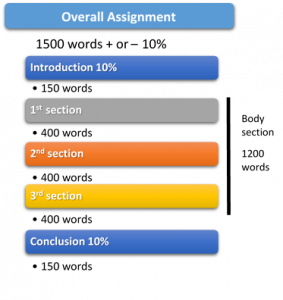
If you have never written an essay before, you may feel unsure about how to start. Breaking your essay into sections and allocating words accordingly will make this process more manageable and will make planning the overall essay structure much easier.
- An essay requires an introduction, body paragraphs and a conclusion.
- Generally, an introduction and conclusion are approximately 10% each of the total word count.
- The remaining words can then be divided into sections and a paragraph allowed for each area of content you need to cover.
- Use your task and criteria sheet to decide what content needs to be in your plan
An effective essay introduction needs to inform your reader by doing four basic things:
Table 20.1 An effective essay
An effective essay body paragraph needs to:
An effective essay conclusion needs to:
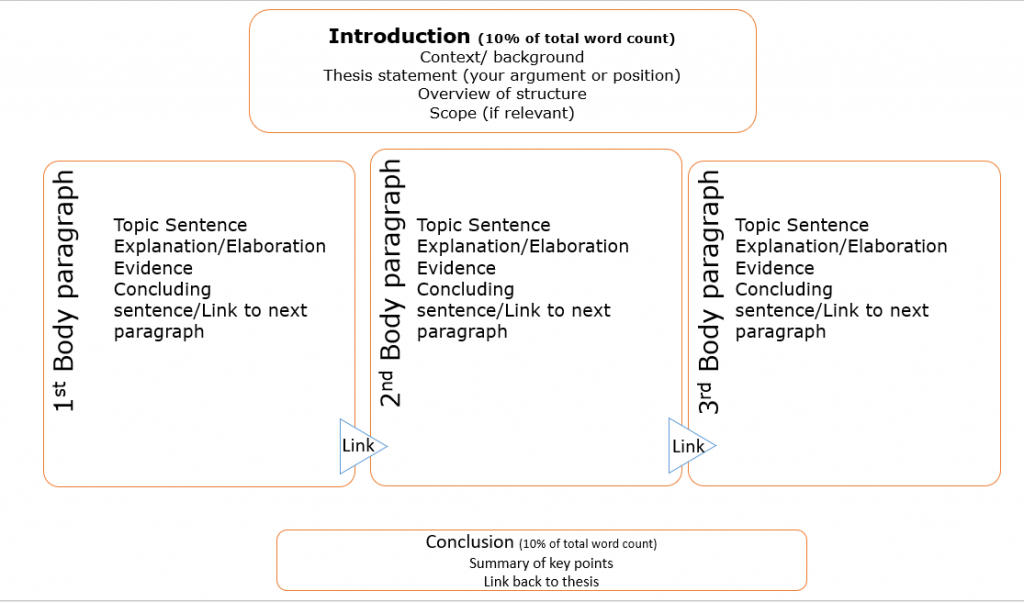
Common types of essays
You may be required to write different types of essays, depending on your study area and topic. Two of the most commonly used essays are analytical and argumentative . The task analysis process discussed in the previous chapter Writing Assignments will help you determine the type of essay required. For example, if your assignment question uses task words such as analyse, examine, discuss, determine or explore, you would be writing an analytical essay . If your assignment question has task words such as argue, evaluate, justify or assess, you would be writing an argumentative essay . Despite the type of essay, your ability to analyse and think critically is important and common across genres.
Analytical essays

These essays usually provide some background description of the relevant theory, situation, problem, case, image, etcetera that is your topic. Being analytical requires you to look carefully at various components or sections of your topic in a methodical and logical way to create understanding.
The purpose of the analytical essay is to demonstrate your ability to examine the topic thoroughly. This requires you to go deeper than description by considering different sides of the situation, comparing and contrasting a variety of theories and the positives and negatives of the topic. Although in an analytical essay your position on the topic may be clear, it is not necessarily a requirement that you explicitly identify this with a thesis statement, as is the case with an argumentative essay. If you are unsure whether you are required to take a position, and provide a thesis statement, it is best to check with your tutor.
Argumentative essays
These essays require you to take a position on the assignment topic. This is expressed through your thesis statement in your introduction. You must then present and develop your arguments throughout the body of your assignment using logically structured paragraphs. Each of these paragraphs needs a topic sentence that relates to the thesis statement. In an argumentative essay, you must reach a conclusion based on the evidence you have presented.
Case Study Responses
Case studies are a common form of assignment in many study areas and students can underperform in this genre for a number of key reasons.
Students typically lose marks for not:
- Relating their answer sufficiently to the case details
- Applying critical thinking
- Writing with clear structure
- Using appropriate or sufficient sources
- Using accurate referencing
When structuring your response to a case study, remember to refer to the case. Structure your paragraphs similarly to an essay paragraph structure but include examples and data from the case as additional evidence to support your points (see Figure 20.5 ). The colours in the sample paragraph below show the function of each component.
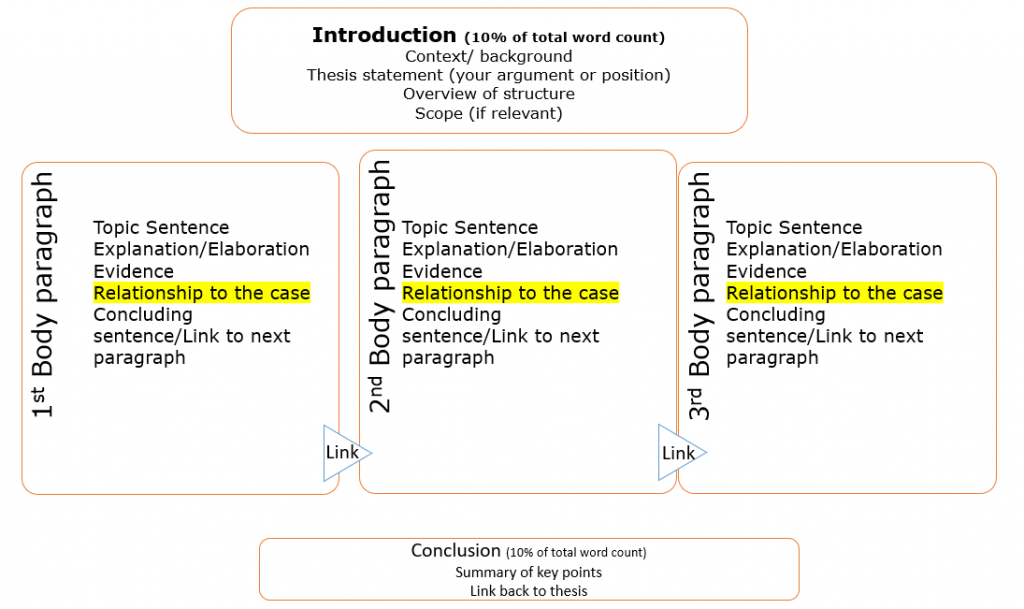
The Nursing and Midwifery Board of Australia (NMBA) Code of Conduct and Nursing Standards (2018) play a crucial role in determining the scope of practice for nurses and midwives. A key component discussed in the code is the provision of person-centred care and the formation of therapeutic relationships between nurses and patients (NMBA, 2018). This ensures patient safety and promotes health and wellbeing (NMBA, 2018). The standards also discuss the importance of partnership and shared decision-making in the delivery of care (NMBA, 2018, 4). Boyd and Dare (2014) argue that good communication skills are vital for building therapeutic relationships and trust between patients and care givers. This will help ensure the patient is treated with dignity and respect and improve their overall hospital experience. In the case, the therapeutic relationship with the client has been compromised in several ways. Firstly, the nurse did not conform adequately to the guidelines for seeking informed consent before performing the examination as outlined in principle 2.3 (NMBA, 2018). Although she explained the procedure, she failed to give the patient appropriate choices regarding her health care.
Topic sentence | Explanations using paraphrased evidence including in-text references | Critical thinking (asks the so what? question to demonstrate your student voice). | Relating the theory back to the specifics of the case. The case becomes a source of examples as extra evidence to support the points you are making.
Reports are a common form of assessment at university and are also used widely in many professions. It is a common form of writing in business, government, scientific, and technical occupations.
Reports can take many different structures. A report is normally written to present information in a structured manner, which may include explaining laboratory experiments, technical information, or a business case. Reports may be written for different audiences including clients, your manager, technical staff, or senior leadership within an organisation. The structure of reports can vary, and it is important to consider what format is required. The choice of structure will depend upon professional requirements and the ultimate aims of the report. Consider some of the options in the table below (see Table 20.2 ).
Table 20.2 Explanations of different types of reports
Reflective writing.

Reflective writing is a popular method of assessment at university. It is used to help you explore feelings, experiences, opinions, events or new information to gain a clearer and deeper understanding of your learning. A reflective writing task requires more than a description or summary. It requires you to analyse a situation, problem or experience, consider what you may have learnt and evaluate how this may impact your thinking and actions in the future. This requires critical thinking, analysis, and usually the application of good quality research, to demonstrate your understanding or learning from a situation. Essentially, reflective practice is the process of looking back on past experiences and engaging with them in a thoughtful way and drawing conclusions to inform future experiences. The reflection skills you develop at university will be vital in the workplace to assist you to use feedback for growth and continuous improvement. There are numerous models of reflective writing and you should refer to your subject guidelines for your expected format. If there is no specific framework, a simple model to help frame your thinking is What? So what? Now what? (Rolfe et al., 2001).
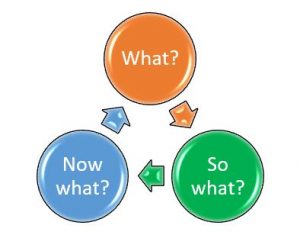
Table 20.3 What? So What? Now What? Explained.
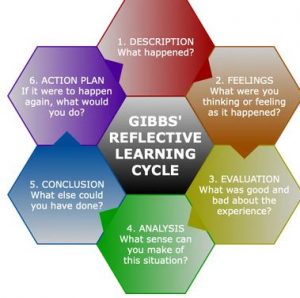
The Gibbs’ Reflective Cycle
The Gibbs’ Cycle of reflection encourages you to consider your feelings as part of the reflective process. There are six specific steps to work through. Following this model carefully and being clear of the requirements of each stage, will help you focus your thinking and reflect more deeply. This model is popular in Health.
The 4 R’s of reflective thinking
This model (Ryan and Ryan, 2013) was designed specifically for university students engaged in experiential learning. Experiential learning includes any ‘real-world’ activities including practice led activities, placements and internships. Experiential learning, and the use of reflective practice to heighten this learning, is common in Creative Arts, Health and Education.
Annotated Bibliography
What is it.
An annotated bibliography is an alphabetical list of appropriate sources (books, journals or websites) on a topic, accompanied by a brief summary, evaluation and sometimes an explanation or reflection on their usefulness or relevance to your topic. Its purpose is to teach you to research carefully, evaluate sources and systematically organise your notes. An annotated bibliography may be one part of a larger assessment item or a stand-alone assessment piece. Check your task guidelines for the number of sources you are required to annotate and the word limit for each entry.
How do I know what to include?
When choosing sources for your annotated bibliography it is important to determine:
- The topic you are investigating and if there is a specific question to answer
- The type of sources on which you need to focus
- Whether they are reputable and of high quality
What do I say?
Important considerations include:
- Is the work current?
- Is the work relevant to your topic?
- Is the author credible/reliable?
- Is there any author bias?
- The strength and limitations (this may include an evaluation of research methodology).
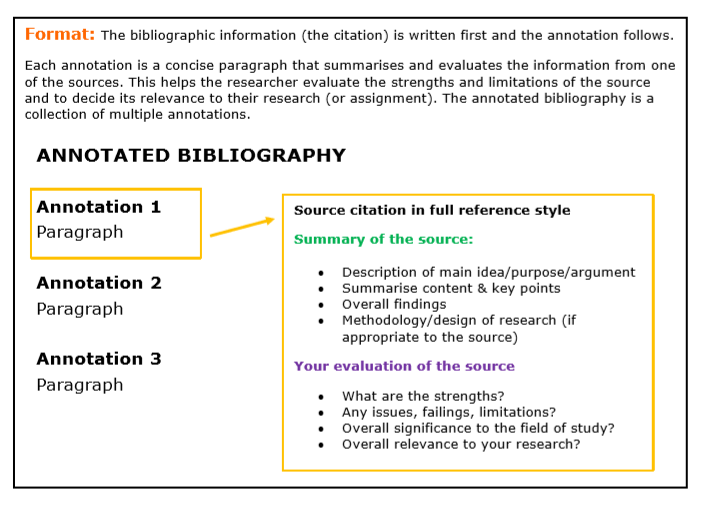
Literature Reviews
It is easy to get confused by the terminology used for literature reviews. Some tasks may be described as a systematic literature review when actually the requirement is simpler; to review the literature on the topic but do it in a systematic way. There is a distinct difference (see Table 20.4 ). As a commencing undergraduate student, it is unlikely you would be expected to complete a systematic literature review as this is a complex and more advanced research task. It is important to check with your lecturer or tutor if you are unsure of the requirements.
Table 20.4 Comparison of Literature Reviews
Generally, you are required to establish the main ideas that have been written on your chosen topic. You may also be expected to identify gaps in the research. A literature review does not summarise and evaluate each resource you find (this is what you would do in an annotated bibliography). You are expected to analyse and synthesise or organise common ideas from multiple texts into key themes which are relevant to your topic (see Figure 20.10 ). Use a table or a spreadsheet, if you know how, to organise the information you find. Record the full reference details of the sources as this will save you time later when compiling your reference list (see Table 20.5 ).
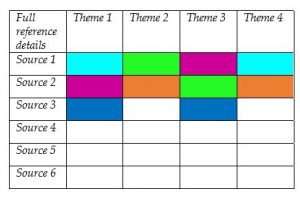
Overall, this chapter has provided an introduction to the types of assignments you can expect to complete at university, as well as outlined some tips and strategies with examples and templates for completing them. First, the chapter investigated essay assignments, including analytical and argumentative essays. It then examined case study assignments, followed by a discussion of the report format. Reflective writing , popular in nursing, education and human services, was also considered. Finally, the chapter briefly addressed annotated bibliographies and literature reviews. The chapter also has a selection of templates and examples throughout to enhance your understanding and improve the efficacy of your assignment writing skills.
- Not all assignments at university are the same. Understanding the requirements of different types of assignments will assist in meeting the criteria more effectively.
- There are many different types of assignments. Most will require an introduction, body paragraphs and a conclusion.
- An essay should have a clear and logical structure and use formal but reader friendly language.
- Breaking your assignment into manageable chunks makes it easier to approach.
- Effective body paragraphs contain a topic sentence.
- A case study structure is similar to an essay, but you must remember to provide examples from the case or scenario to demonstrate your points.
- The type of report you may be required to write will depend on its purpose and audience. A report requires structured writing and uses headings.
- Reflective writing is popular in many disciplines and is used to explore feelings, experiences, opinions or events to discover what learning or understanding has occurred. Reflective writing requires more than description. You need to be analytical, consider what has been learnt and evaluate the impact of this on future actions.
- Annotated bibliographies teach you to research and evaluate sources and systematically organise your notes. They may be part of a larger assignment.
- Literature reviews require you to look across the literature and analyse and synthesise the information you find into themes.
Gibbs, G. (1988). Learning by doing: A guide to teaching and learning methods. Further Education Unit, Oxford Brookes University, Oxford.
Rolfe, G., Freshwater, D., Jasper, M. (2001). Critical reflection in nursing and the helping professions: a user’s guide . Basingstoke: Palgrave Macmillan.
Ryan, M. & Ryan, M. (2013). Theorising a model for teaching and assessing reflective learning in higher education. Higher Education Research & Development , 32(2), 244-257. doi: 10.1080/07294360.2012.661704
Academic Success Copyright © 2021 by Cristy Bartlett and Kate Derrington is licensed under a Creative Commons Attribution-NonCommercial-ShareAlike 4.0 International License , except where otherwise noted.
Share This Book

Most popular articles

+21 Inspiring Productivity Journal Prompts For Setting And Achieving Your Goals

+27 Perfect Lowkey First Date Ideas That’ll Impress

How To Organize Assignments So You Never Miss A Due Date Again
If you aren’t a pro at organizing your assignments for school, I guarantee you will be after this! One of the first things a student should do before school starts is to make sure that they have a reliable way to organize their assignments. This is why I’m going to teach you how to organize assignments so you never miss a due date again!
Putting all of your assignments for the semester in at least ONE place will actively remind you of your due dates so you don’t ever forget them. I will go through some of the most popular methods to organize your assignments as well as let you know which method I prefer the best.
How To Organize Your Assignments As A Student
The three major ways you can organize your assignments include using a school planner app, using a physical planner, and using Google Calendar. All of these methods have their benefits and drawbacks, but they all have been proven to work and I know you will find the perfect method for you.
myHomework App
One of my favorite apps for college students is myHomework ! It is the ultimate app for organizing your assignments. You all do not understand how life-changing this one app was when I discovered it during my freshman year! Because of myHomework, I never missed an assignment due date. The best part is that it’s extremely easy to use! Check out the tutorial video below.
how to organize with myhomework:
- Download the app from your app store
- Create a free account
- Color code each class
- Put in what times you will take that class
- What type of assignment it is
- Priority level (how important/urgent it is to get it done)
- Reminders (so you don’t forget to actually do it)
- Attach any additional files (instructions, deadline timeline, etc.)
- And completing an assignment is as easy as swiping to the left and poof💨 it’s gone!
This is by far my favorite method because after you set everything, you’re done! Unlike a physical planner where you have to constantly refer to what you wrote, with this app, you can get automated notifications and reminders for each assignment. Spend a day before the semester begins to take a couple of hours to import all of your assignments. Seriously focus on customizing exactly how you want (reminders, priority level, etc). Once you’re done, you will have a complete look at every single assignment you will need to complete and any additional information right at your fingertips. It’s simple, straightforward, and reliable.
Why it works:
- Built-in structure for organizing classes and assignments
- See monthly, weekly, and daily views of assignments that you need to complete
- Your data can sync across multiple platforms
- Supports time-block and period-based schedules
- It’s 100% free
Related Article ⇾ The Best Essential iPhone Apps For Students
Planner Method
Another way to make sure you keep track of your assignments is to have a physical planner. This is the old-school way that still gets the job done. I don’t know if you’ve noticed, but there are new planners with different and cool features popping up constantly. There’s a reason why… Planners work when you make them work! The steps for this method are very similar to the steps you would use with the myHomework app.
- Go through each syllabus and write the classes you will be taking (in the notes section of your planner)
- I would also highlight them in a particular color and write the days and times that you will take these classes
- Write down every single assignment that you will have to turn in throughout the semester on its due date
- Add in every quiz and test day as well as the day you will have to take them

Now the next thing you need to do is create reminders. As far as reminding you when things are due, there are many options:
- You can write reminders in your planner. If you have all of your due dates in your monthly view (as I instructed and recommended above), you can then use the daily or weekly view to insert reminders weekly of assignments/quizzes/projects/tests coming up.
- If you have all of your due dates in your planner, you can couple this method with using your phone for reminders. Using apps such as Google Calendar or the regular Calendar app can help you get instant reminders to work on assignments and study for tests.
I will have a post all about the best college planners soon! I have tried countless planners. So, I can’t wait to share what has worked a lot for me and how it can help you as well. So stay tuned by signing up for my email list to know when that post will be live!
- You’re more likely to remember things when you write them down
- Complete freedom in organizing and being creative with your planning
- You don’t have to worry about not having wifi
Google Calendar
Google Calendar is a God-send. I prefer this method right now in my daily life because it helps me stay organized and informed of my schedule at ALL times!! I have a complete tutorial on how I set up and organize my Google Calendar so I will have that linked below. But I want to give some great tips in this article as well for organizing your classes and assignments!
Related Article ⇾ How To Time-Block Your Life For Success
Google Calendar has an incredible feature that allows you to create different calendars. For example, I have a calendar that’s strictly for work-related things, I have one for getting random things done, which is appropriately named “Getting Sh*t Done”, and even a calendar strictly for family things. I can also subscribe family members to the “family” one so we all know what is going on.
Color coding helps keep everything more organized as well. Different colors mean different calendars. Choosing brighter colors can be for the more important calendars such as work and appointments and dimmer colors can be for more routine things.
How to apply this method to your classes:
- This allows you to color-code your classes to differentiate every class and their assignments
- This blends every class together, but you will be able to determine what’s school-related and what is not related to school in your schedule
- This helps you see a clear difference between when you have classes when things are due, and when you will work on the things that are due (study time)
- Complete organization of classes and assignments
Final Things To Consider
Choose what works for you. I like to give different options because I know everyone is different. What works for me might not work for you. So try one way of organizing your assignments. If it doesn’t work out, no biggie, just move on to a new method. The goal is to keep trying until you find that magic formula that helps you stay on top of your school life.
Don’t wait to import your assignments. This is a major pro tip. There was a time one of my professors added a random assignment that we had to complete that semester and I forgot to put it in the myHomework app, so I missed it 🥴 lol… This is why I encourage you to always put things in your planner when your teacher announces any extra assignments or extra credit opportunities that may not have been on the syllabus – right when it’s announced . Otherwise, you will most likely forget. Also, check out my post about how you can get every assignment, even new/random ones automatically imported into your Google Calendar if your school uses Canvas.
Related Article ⇾ How To Sync Your Canvas Calendar To Your Google Calendar
Lastly, make sure you insert reminders for every assignment. In the case that you do forget about a due date, you have enough time to complete it because you placed a reminder for that assignment. Whether you’re super busy or not, we constantly forget things throughout the day and it’s important to have that sort of virtual “personal assistant” to remind us of things. So use your phone to your advantage and make sure you keep track of your due dates.
Many classes, especially in college, won’t allow you to turn in anything late. Which makes organizing your assignments and due dates that much more important!
If you have any other ways that you organize your assignments and due dates, please leave them in the comments below. I’d love to hear how you organize your class dates. I hope you’ve found some awesome ways how to organize assignments in a way that works for you!

Similar Posts

Overcoming Graduation Anxiety: Why You Shouldn’t Be Scared Of Graduating

35+ Amazing Christmas Gift Ideas for Students

Why I Might Drop Out of College Due to COVID-19

10 Essential Apps for College Students

The BEST Studying Technique You Need To Start Using

+17 College Tour Questions To Ask Your Campus Tour Guide
- Pingback: Genius Tips On How To Mentally Prepare For A New Semester in 2022
This is great advice! I’m looking into these tools, I think they will help a lot. Thank you 🙂
Leave a Reply Cancel reply
Your email address will not be published. Required fields are marked *
Save my name, email, and website in this browser for the next time I comment.
Notify me of follow-up comments by email.
Notify me of new posts by email.
Review Cart
No products in the cart.

How Can I See All the Assignments My Students Have Completed?
MobyMax offers a hassle-free way for teachers to assign skills to their students and monitor their progress. With our Assignments module, teachers can easily assign new skills to individual students or a group of students, and keep track of their completed assignments. The module provides a central location for teachers to view all the completed skills assignments for each student, including the date and time the assignment was completed. To view completed assignments for a student:
- Sign in to your MobyMax teacher account.
- Click on the "Assignments" link under your Quick Access menu.
- Select the "Students" tab at the top of the page.
- You can click on the "Date Completed" column header to sort by the date that the assignment was completed.
- Click on the name of the assignment under the "Assignment Name" column to view detailed information on the selected assignment.
Note: By using the drop-down menus, teachers can easily filter assignments by specific dates, assignment types, and grade levels.

- Sign in to your MobyMax teacher account.
- Click the "Assign Skills" link from the left sidebar under the "Tools" header.
- Select the “Scores” tab at the top of the page.
- Click on the number for a student under the "Completed Assignments" column.
- Use the drop-down menu to filter by specific subject, or use the arrow buttons next to the student name to cycle to the next student in your roster.
Did you find it helpful? Yes No
Related Articles
- How To Remove Assignments in Mathematics
- How Do I Adjust the Start Date for an Assignment That I've Created?
- How Do I View All Assignments That Have Been Assigned to My Students?
- How Do I Print Writing Assignments Rubrics for My Students?
- CBSSports.com
- Fanatics Sportsbook
Football Pick'em
College Pick'em
Fantasy baseball, fantasy football, fantasy basketball, fantasy hockey, franchise games, 24/7 sports news network.
- CBS Sports Golazo Network
- PGA Championship
- UEFA Champions League
- UEFA Europa League
- Italian Serie A
- Watch CBS Sports Network
- TV Shows & Listings
The Early Edge
A Daily SportsLine Betting Podcast
With the First Pick
NFL Draft recap
- Podcasts Home
- The First Cut Golf
- Beyond the Arc
- We Need to Talk Now
- Eye On College Basketball
- NFL Pick Six
- Cover 3 College Football
- Fantasy Football Today
- My Teams Organize / See All Teams Help Account Settings Log Out
2024 Preakness Stakes post positions, odds, entries, field, lineup, horses, start time, complete guide
The second leg of the triple crown got a little more interesting when the favorite was forced to withdraw.
With the Kentucky Derby now in the books, all the attention in horse racing turns to Pimlico Race Course in Baltimore, Maryland for the 149th running of the Preakness Stakes. Dubbed the "People's jewel" of thoroughbred racing, this event typically separates the contenders from the pretenders when it comes to the Triple Crown. Mystik Dan has the chance to make history after winning at Churchill Downs earlier this month and heads into the eight-horse field on Saturday as the favorite.
There will be one notable name absent from the starting gates as Muth was scratched early in the week. The morning-line favorite, trained by Bob Baffert, was pulled from the race after suffering a spike in temperature upon arrival to Pimlico. Now, it could be any one's race to win given the smaller field.
Trainer Ken McPeek remains confident in Mystik Dan ahead of the second straight massive race in just three weeks.
Baffert is no stranger to the winner's circle at Pimlico. National Treasure, another horse trained by the prolific trainer, won the 2023 Preakness Stakes at 4-1 odds. In fact, Baffert has won the Preakness Stakes more than any other trainer in the race's storied history.
Catching Freedom, the fourth-place finisher at the Kentucky Derby is also among the favorites with 7/2 odds. Rounding out the top of the field is Tuscan Gold (9/2), trained by Chad Brown, who has been to the winner's circle at Pimlico twice in his career already.
Here is how you can watch the action on Saturday evening along with the post draw and latest odds on the race. Stay tuned to this page for any news or developments ahead of post time.
How to watch the 2024 Preakness Stakes
Date: Saturday, May 18 Post time: 7:01 p.m. ET Location: Pimlico Race Course -- Baltimore, Maryland TV: NBC | Stream: fubo (try for free)
2024 Preakness Stakes post positions
- Mugatu (20-1)
- Uncle Heavy (20-1)
- Catching Freedom (6-1)
- Muth (8-5)*
- Mystik Dan (5/2)
- Seize the Grey (15-1)
- Just Steel (15-1)
- Tuscan Gold (8-1)
- Imagination (6-1)
Muth was scratched from the race on Wednesday
2024 Preakness Stakes odds (sorted)
- Mystik Dan 5/2
- Imagination 6-1
- Catching Freedom 6-1
- Tuscan Gold 8-1
- Seize the Grey 15-1
- Just Steel 15-1
- Mugatu 20-1
- Uncle Heavy 20-1
So who wins the 2024 Preakness Stakes? Where does Mystik Dan finish? And how has Yu constructed her wagers? Visit SportsLine to see Yu's picks for the Preakness Stakes , all from the Santa Anita Park-based racing insider who has hit the exacta in the Preakness Stakes the last two years, and find out.
Our Latest General Stories
2024 Preakness Stakes: How to watch, start time, horses
Austin nivison • 1 min read.
2024 Preakness Stakes odds, futures picks, exotics
Cbs sports staff • 2 min read.
2024 Preakness Stakes: Exacta, trifecta and superfecta
Cbs sports staff • 3 min read.
2024 Preakness Stakes expert picks with Muth scratched
2024 preakness stakes picks from exacta champion, 2024 preakness stakes cheat sheet, racing form, cbs sports staff • 4 min read, share video.

2024 Preakness Stakes post positions, odds

Edwards climbs another rung on superstar ladder

Schauffele takes control of narrative

Darvish makes history after latest gem

NBA will have sixth champion in 6 years

What's next for Nuggets after stunning exit?

NBA world reacts to Wolves' Game 7 comeback win

Haliburton wears 'choking Reggie' sweatshirt after win

Knicks have everything they need to eventually win

Former All-Pro running back announces his retirement
A .gov website belongs to an official government organization in the United States.
A lock ( ) or https:// means you've safely connected to the .gov website. Share sensitive information only on official, secure websites.
- Data and Statistics on ADHD
- Free Materials on ADHD
- Attention-Deficit / Hyperactivity Disorder Articles
- Clinical Care and Treatment
Attention-Deficit / Hyperactivity Disorder (ADHD)

About Attention-Deficit / Hyperactivity Disorder (ADHD)

Is it ADHD?

Symptoms of ADHD

Treatment of ADHD

ADHD Information and Resources for States

School Changes — Helping Children with ADHD

CDC's Attention-Deficit / Hyperactivity Disorder (ADHD) site includes information on symptoms, diagnosis, treatment, data, research, and free resources.
For Everyone
Health care providers.

COMMENTS
12. Proofread your assignments. Once you've completed the assignment, take the time to proofread it. This will help you catch any mistakes and make sure that your work is of the best quality. 13. Submit your assignments on time. Make sure to submit your assignment on time. If you're having trouble with this, talk to your professor or a tutor.
The story of this amazing sample essay database and academic writing company dates back to June 2015. Since then, they have collected a great resource for students coming from all disciplines. The company's website claims that they have completed over 100,000 assignments as 2021 has started.
What this handout is about. The first step in any successful college writing venture is reading the assignment. While this sounds like a simple task, it can be a tough one. This handout will help you unravel your assignment and begin to craft an effective response. Much of the following advice will involve translating typical assignment terms ...
Download Article. 1. Ask your parents or peers for help. Parent involvement in homework has been shown to help with homework completion and improved academic performance. [15] Asking a friend for help in understanding a concept or an assignment can go a long way in helping you complete your homework on time. [16] 2.
4. Set Goals: - Establish daily or weekly goals for completing portions of your assignments. Setting achievable milestones will help you stay on track and motivated. 5. Minimize Distractions: - Find a quiet and focused workspace to minimize distractions. Turn off social media notifications and other distractions while working on assignments.
Steps for completing an assignment. First, carefully read the assignment. Make sure you understand what your instructor is looking for in terms of content, formatting and structure. It's also vital that you know when the assignment is due and start working on it well before the due date. If you have any questions about the assignment, ask ...
Best Paid Homework Help Site: Chegg. Price: $14.95 to $19.95 per month. Best for: 24/7 homework assistance. This service has three main parts. The first is Chegg Study, which includes textbook solutions, Q&A with subject experts, flashcards, video explanations, a math solver, and writing help.
1. Create A Time Table. At least a week before the official commencement of class, a course outline is usually posted in the course area. This course outline gives the assignments for each week. Get a head start by reviewing the eLearning course outline, a day or two prior, instead of waiting until class begins.
A "2" assignment is important. Some negative consequences will occur if this assignment is not completed tonight. Examples: Studying for a quiz coming up tomorrow. Completing a homework sheet that is due tomorrow. Reading a chapter that is due tomorrow. A "3" assignment needs to be finished by the end of the week.
If you are asking your students to complete a writing assignment, you should define for them the "rhetorical or cognitive mode/s " you want them to employ in their writing (Flaxman, 2005). In other words, use precise verbs that communicate whether you are asking them to analyze, argue, describe, inform, etc. (Verbs like "explore" or ...
Dear [manager], I completed the task and attached the documents related to the assignment. If you want to elaborate a bit, you could write something like: Dear [manager], I have finished the assignment you gave me yesterday. Please find attached the documents I prepared for this assignment. Kind regards, Praveen
I've successfully completed all assigned tasks for the project. Please find a breakdown below: {{Completed task 1}} {{Completed task 2}} {{Completed task 3}} {{Completed task 4}} I've attached {{Name Of Project File You've Attached}} and would appreciate it if you could review and alert me of any relevant changes. Thank you for your time ...
Many instructors write their assignment prompts differently. By following a few steps, you can better understand the requirements for the assignment. The best way, as always, is to ask the instructor about anything confusing. Read the prompt the entire way through once. This gives you an overall view of what is going on.
Check the boxes for all the students whose assignments you want to return. Click Return. Can I return classwork without a grade? Yes, if the grade field is left empty.However, if the assignment is ungraded, the open LTI standard can't indicate that an assignment has been completed. The LMS can't distinguish between ungraded and unsubmitted ...
Types of Assignments Cristy Bartlett and Kate Derrington. Figure 20.1 By recognising different types of assignments and understanding the purpose of the task, you can direct your writing skills effectively to meet task requirements. Image by Armin Rimoldi used under CC0 licence. Introduction. As discussed in the previous chapter, assignments are a common method of assessment at university.
Download the app from your app store. Create a free account. Create a folder for each class you're taking. Color code each class. Put in what times you will take that class. Import your assignments for each class and input: What type of assignment it is. Priority level (how important/urgent it is to get it done)
Manages time to complete multiple tasks in a timely manner. Prioritizes projects for maximum productivity. Allocates time effectively to complete a wide range of tasks. Is highly regarded and respected for her ability to multitask. Fully competent: Meets expectations. Readily assumes and completes multiple assignments. Regards multitasking as ...
Like, "I had completed all the tasks before I took my lunch break". If you didn't give another event, it would sound -- to me, anyway -- like the "past state no longer in effect" case, implying that they were complete at some time in the past but then something happened so that they are not complete now. Like something happened to ruin what you ...
With our Assignments module, teachers can easily assign new skills to individual students or a group of students, and keep track of their completed assignments. The module provides a central location for teachers to view all the completed skills assignments for each student, including the date and time the assignment was completed.
2. Create a detailed timetable. A timetable helps you plan your tasks. Assign all your missing assignments time. Schedule more time for the tough assignments. Remember you are on a deadline, so whatever time you estimate an activity might take, reduce it by at least 5 to 10 minutes. You have to be ruthless and, at the same time, realistic when ...
PowerBuddy for Learning. PowerBuddy for Learning is the personal assistant for teaching and learning. PowerBuddy makes educators' lives easier by helping them easily create high-quality assignments and instructional content. Students benefit from an always-available personalized assistant to support them in the way they choose to learn.
What field must be completed first before the assignment can be created? Projected Begin Date. Study with Quizlet and memorize flashcards containing terms like Which of the following statements is correct?, (T/F) The Spousal Letter can be opened in IPPS-A., What is the maximum number of profiles that can be printed at one time? and more.
Items appear as links when you open an assignment to work on it.. To complete an item, you must do one of the following for all of its main part questions (Part A, B, etc.) — Submit a correct answer, run out of answer attempts, or choose Request Answer (will show either correct answer or "Completed; answer withheld by instructor").; Some part questions in an item may be unavailable for you ...
For Mastering items and assignments that include Mastering items: An item is complete if, for each part of the item (Part A, Part B, and so on), the student has either submitted the correct answer, used all attempts, requested the answer, or given up.; An assignment (including an Adaptive Follow-Up assignment) is complete if all parts of all regular-credit items are complete.
Join us for this afternoon's commencement exercises for our graduating class of 2024. #ForeverToThee24
2024 Preakness Stakes post positions, odds, entries, field, lineup, horses, start time, complete guide The second leg of the Triple Crown got a little more interesting when the favorite was forced ...
Find information on symptoms, diagnosis, treatment, data, research, and free resources.